#because they inherently have more power than we do in real life
Text
The thing with news sources and deciding what's trustworthy and what's not is that when you see criticism of Aljazeera (which to be clear is not a great news source about anything other than Palestine) is that they completely neglect to mention that each regional section of Al-Jazeera has different people in charge of it, different contributors, different sources.
By all means, analyze your sources and understand what information you're getting but to say outright that ALL of what AlJazeera reports EVER is wrong is inherently meant to discredit Palestinian journalists in a way that no other journalist who is not Palestinian and NOT directly experiencing the war in Gaza has been discredited. Surprisingly (not really but), a lot of Palestinians in Gaza are employed by AlJazeera because it's difficult for them to find employment elsewhere.
And again, I do not love AlJazeera. I think they do plenty of faulty journalism and reporting and I actively avoid them for most news sources. But RIGHT NOW with everything going on in Gaza, they're probably one of the most trustworthy ones because of their first hand accounts and willingness to publish Palestinian voices, which many, MANY news stations refuse to do. I especially encourage the Arabic version of AlJazeera!
Like Haartz has like... 4 Palestinians on their editorial team max, and they have EVEN LESS people on the ground in Gaza whereas we have dozens of reporters from Gaza on Al-Jazeera, many of which have died. The way to fact check your news is you find how many times they link factual evidence (like videos of experiences, primary accounts, primary quotes) and compare it with circumstance of publishing.
Here are some ways to fact check and questions to ask, even when looking at Al Jazeera:
Is this a first hand account? If not, does it name a person who experienced this first hand?
If they cite/name a person who experienced it first hand, are they a trustworthy person? What are their ties to the situation? Why would they report this, have they reported situations like this in the past?
What would the person reporting gain from reporting this? A Palestinian with an Instagram post about their life in Gaza has much less to gain than an Israeli soldier publishing their experience in Gaza, for example.
In the first hand account, are there actions or evidence that is corroborated? IE: There was a video of an Israeli soldier abducting a blonde Palestinian, and there was a Human Rights Org that reported child abductions from evidence gather by an on the ground reporter. There is less of a chance that this is false, therefore.
If you don't see other news sources reporting this (ie, you don't see CNN/NYT/BBC/Fox/any other western-led media outlet) then ask: Why would they not report it? Does that mean it's false? Maybe not. Many Euro-american sources spend MONTHS before they talk about an issue (think: Washington post article "questioning" the evidence of Hamas in Al-Shifaa hospital more than a month after the raid happened)
Defining "Trustworthy":
What is their history on reporting events? Are they someone who is well known in whatever community they represent?
Think: Ghassan Abu-Sitta, a world renowned doctor. When he reports something with his name attached, he is putting his entire reputation on the line. Therefore, it is more likely he is telling the truth.
Are they someone who has any real, structural power over the situation? Maha Hussaini, for example, cannot change her circumstances because a ceasefire relies on other people separate from her, a journalist. Therefore, she has less of a reason to lie about things happening to her.
For the news source: what are their ties to the situation? CNN, for example, has stated they have their content reviewed by the IDF. Wael Al-Dahdouh, before he was evacuated, was providing first hand accounts of situation, meaning its difficult for him to fake anything or misrepresent.
What else has this person/news source reported? What are their political leanings — not just left/right, but what are their general stances on a variety of issues?
How many people who are part of the community impacted are part of reporting on this (IE: How many Palestinian POVs are shared, how many Israeli POVs are shared, what are the POVs of the people shared in general?).
Can someone I personally trust vouch for this person? If not, can I ask someone I trust to look over this person/agency and tell me their opinion?
There's for sure more I'm forgetting but these are some ways I personally check my facts and information as a quick rundown. And I see this issue of not knowing how to fact check happen ALL OVER the place, on both sides. So I really, highly encourage everyone to engage with sources more honestly!
You'll make mistakes, everyone does! I do as well! But try to be vigilant about these things so we can ensure that we're spreading accurate information and try to correct information when possible! There's no 100% unbiased source so I encourage you to compare/contrast information and your understandings of the world to fully comprehend the situation!
Please use these questions when checking ANY news source, even Al-Jazeera!
5K notes
·
View notes
Text
When people talk about there being "evidence" for the theory that Crocodile could be Luffy's other bio-dad, they tend to point out these kind surface-level details, easter eggs and Crocodile's odd behaviour during the Marineford-arc.
And while all of that is very important as it lays down the groundwork for explaining the theory to people, unironically I think there's even more to the theory. When you really think about the implications the theory has on Crocodile's character and how that would tie into the long running narrative elements and themes in One Piece as a whole, I think it kind of changes everything
So, in this post I want to analyze and speculate about the theory, going a bit "beyond" the basics we already know. Heavy emphasis on the speculation-part, because I'm not here to provide conclusive evidence to prove that Crocodad is Real, rather, I'm here to speculate about how it could be real in practise, and try to explain how so many things would suddenly add up if the theory was true. I'm here to prove that Crocodad would make sense on a narrative level.
Quickly starting with a brief-ish summary of the Basic Thesis of the Crocodad Theory, just so we're all on the same page:
Naturally, if you already know the basics, feel free to skip this bit
Crocodile has secret beef with Ivankov. Although there is no proof that the beef has anything to do with Crocodile being trans, when you go out of your way to introduce a new character whose power is Magic HRT, it's a natural conclusion for people to assume that if these two know each other, then Crocodile could be a trans man. And naturally, if we're assuming he's Luffy's other dad, then he has to be trans
Dragon, as the leader of the Revolutionary Army, is in canon considdered to be the world's Most Wanted Criminal. He is extremely famous as pretty much everyone (except Luffy) knows who he is
Crocodile knowing the second-in-command of the Revolutionary Army doesn't inherently mean he was involved with the Revolutionaries, nor that he has ever met Dragon, but being familiar with Ivankov means it is entirely plausible the two could've met in the past
(Sidenote but I do have a loose theory how Crocodile could've been involved with the Revolutionaries; not relevant here but if you wanted to read it, here you go)
Despite this, when Dragon is revealed to be Luffy's father during the Summit War, although Oda includes the reactions of all the other Shichibukai, he very specifically leaves out Crocodile's reaction to the revelation. This is suspicious as hell, because surely, between his ties with Ivankov and Dragon being world famous, he would've had some thoughts about Luffy being Dragon's son (wrote about this in more depth)
For Crocodad to be real, we are assuming that Crocodile did not know Luffy was Dragon's/his son until Sengoku's announcement during Marineford, this being the reason Oda didn't show that reaction; it would've been too revealing
(We are assuming that Dragon never told Crocodile his name; this is entirely plausible considdering his full name had been a secret to the whole world (as explained post-Enies Lobby), and Dragon had kept the existence of his son a secret even from Ivankov and Kuma. We also need to assume that Crocodile did not name his son, otherwise surely he would have realized Luffy was his son when they met in Alabasta)
This is why Crocodile ends up saving Luffy's life twice in Marineford (as well as Ace's) when until the revelation he had no reason to even care about the idiot
Crocodile choosing to save Luffy's life probably means one of two things; either he really hates the World Government more than the child who foiled his plans to take over Alabasta, or he cares about his son despite knowing Luffy hates his guts
Again, this is just the basic concept, if you want to read more and see all the more easter egg-type hints, I'd reccomend this post, this post and this post (the third one repeats most of the stuff the first two do in but less detail, but also adds a few more notes extra notes). But now that we're generally speaking on the same level, we can delve deeper.
Please, go get yourself a drink and maybe a snack, this is gonna get long and deranged
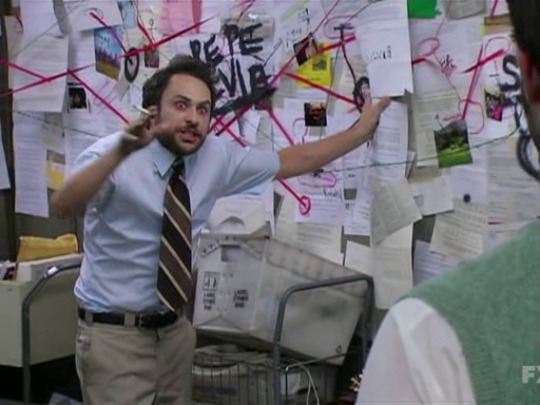
Going to start with a fairly small thing.
Through out the series Oda has been repeatedly hinting at Crocodile having A Past, some History, A Backstory that lead to him becoming the way he is. But Oda hasn't actually told us what that backstory is. On the surface, this wouldn't be that strange, after all, there's lots of characters whose backstories we haven't seen, for example Mihawk. We know essentially nothing about that man and how he became the way he is.
But what's different about Crocodile as opposed to Mihawk and many others, is that Oda hasn't hinted at there being an interesting backstory there that's worth telling. Like I'm sure Mihawk could have an interesting story, but Oda hasn't alluded to that at all. So the fact that he has repeatedly told us that Crocodile does have a backstory, but at most gave us two whole breadcrumbs in an SBS, is a little suspicious.
(For clarity, the hints we've gotten so far to Crocodile's backstory were his repeated comments about not trusting people and how he had given up his dreams in Alabasta, while Summit War gave us the Secret Beef with Ivankov and his grudge against Whitebeard. In an SBS in Vol 78, Oda did confirm that Crocodile had his ass kicked by Whitebeard after he became a Warlord in his early 20s, and that he went "quiet for a while" until he started his heroics around his 30s, setting his eyes on Alabasta. Indeed, we have some breadcrumbs of lore, but this hardly paints a full picture. We know nothing abot what he was doing in his late 20s, which would've been the time Luffy was born btw)
What I'm getting at, is that Crocodile clearly has a backstory, but the fact that Oda hasn't spilled the beans yet would indicate to me that it's likely Oda has been saving up that backstory. Which would make sense, Crocodile hasn't been in a role in the story yet where spending time to tell his story would've been appropriate. So really, we're just waiting for the right time for those beans to be finally spilled.
But what makes things even more interesting is that One Piece has a very specific track record of not giving its villians extended and dedicated backstories/flashbacks. Villians can cameo in other characters' flashbacks (Moria, Arlong), they can have their own little segments inside the the heroic characters' flashbacks (Orochi, Doflamingo), they might even get their own SHORT dedicated flashbacks (Lucci whose flashback was 6 whole panels long). But villians do not get their OWN, dedicated and EXTENDED flashbacks. Flashbacks are for the heroic characters.
There has been a single exception to this rule and that was Big Mom. That's it. And while I'm positive this rule is going to be broken at least one more time before the series ends, really. What do you think is more likely to happen?
That Crocodile becomes such an important villian again, this late in the game, that he deserves his own flashback so we can finally find out what his deal is? (When Blackbeard and Imu are also there mind you) Or that Crocodile's role in the story might not be that of a villian anymore, and that Oda had been saving up his backstory all this time because it could reframe his entire character and how we view him?
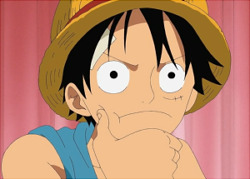
Oda loves taking inspiration from various mythologies and pop culture alike to bring life into his work.
This is nothing new or surprising, we all know this.
For example, Oda did base the original seven Shichibukai on the Seven Heroes from Romancing SaGa 2, each Warlord more or less matching a description of one of the game's villians. Crocodile just happens to match Wagnas, the queer coded leader of the group, who had the noble swordsman Noel (Mihawk) by his side when the group was created to save the world from a great evil.
Meanwhile Alabasta as a whole took a lot of inspiration of Egyptian mythology, Crocodile in that arc matching the role of the crocodile-god Sobek. Sobek is a protector god ("Guardian of Alabasta"), associated with military power (literally what Crocodile wanted to obtain) and fertility, carrying the epithet of "he who loves robbery" (man stole a lot of things, from money and lives to rain and nearly a whole dang country). Sobek's name is speculated to come from the words "to impregnate" or "to unite", both being potentially very interesting coincidences (depending on if Crocodad Real and what Cross Guild's purpose in the story is going to be) (if you want more details you can go read the Wikipedia article on Sobek). (Also I'm sure there's something interesting to be said about Sobek's fusion with the sun deity Ra, Sobek-Ra, and how Luffy is our lil Sun God)
The reason I'm pointing this out is that based on Oda's hinting and/or references to mythologies, people have in the past been able to predict certain plot twists and reveals way ahead of time. For example, most recently people were able to predict that Saint Saturn had been the one to give Ginny (and by extension, Bonney) the Sapphire Scale-disease based on a certain legent about ushi-oni, which is what Saturn just happens to be. (Here's one of the many Reddit posts that predicted that reveal)
And there is one particular story from Japanese mythology I want to bring up, as it may be relevant to our Crocodad Discussion here. The story of Toyotama Hime. Here's a quick TL:DR;
Princess Toyotama had travelled from the depths of the ocean onto land so she could give birth to her child. When the time to deliver the baby came, Toyotama asked for her husband, Hoori, to not look at her while she gave birth, as she would change into her true form. And while Hoori promised he wouldn't look, he couldn't keep the promise. He peeked in on her wife as she was giving birth, only to discover that she had transformed into a gigantic wani. Horrified by what he had seen, Hoori fled, leaving his wife and child behind. Hurt by what had happened, Toyotama abandoned her son and returned to the ocean.
(You can read different summaries of the legend on the Wani-article as well as Toyotama's article on Wikipedia)
Now historically speaking, "wani" in mythology can have referred to serpent dragons, sharks or sea monsters. But in modern Japanese, the word translates to "crocodile". It's what Luffy and a few other characters call Crocodile on numerous occassions. Hell, Crocodile's favorite pets are his gigantic bananawani. Historically speaking it might be more accurate to say that Toyotama had transformed into a sea serpent, but for our intents and purposes, Hoori abandoned Toyotama after she became a crocodile.
I can not tell you what exactly the relationship between Dragon and Crocodile was like, how it began and how it ended. There's no way for us to know when Crocodile transitioned (beyond "after giving birth to Luffy"), nor do we know how Dragon found out about it and how he reacted to it. There's a million options for how things could've gone down, and nothing to truly go off of to even make a guess.
All we do really know, is that 1) Dragon does not seem to wear rings at all. 2) Crocodile wears rings, but leaves one out specifically on his ring finger, where one would normally wear their engagement/wedding ring (mind you; for the first half of Alabasta Oda drew Crocodile without a ring on his middle finger, but from the latter half onwards, through Impel Down and Marineford, it's always the ring finger). 3) This suspicious ass comment
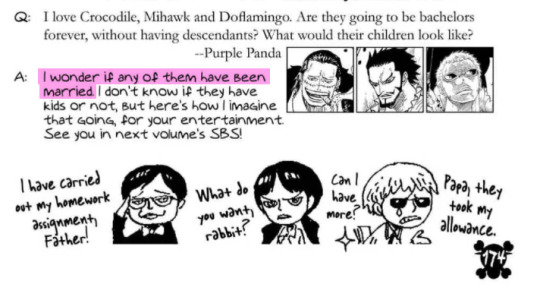
"I don't know they have kids or not" YEAH RIGHT
If we wanted to use the story of Toyotama Princess as a jumping off-point though. It's entirely plausible that soon after giving birth Crocodile transitioned thanks to Ivankov's ability, and because Dragon wasn't into it, the two broke up/got divorced.
The unfortunate reality is that many couples end up breaking up if/when a partner comes out as trans and chooses to transition. Just like Hoori abandoned his wife because she turned into a crocodile, Dragon could've divorced Crocodile because he transitioned into a man.
And Dragon would not be a bad person for it (as long as he was respectful about it). If Dragon is straight and just couldn't see himself being with a man, that's just how it is. At the same time, this would be a gut wrenching, painful thing to go through, and this kind of heartbreak could have devastating concequences for Crocodile's character. Concequences that could play deeply into One Piece's long running narrative elements, which is why a lot of my speculation from here on does end up relying on the Toyotama Myth possibly being inspiration for Crocodile's secret backstory. I acknowledge there's no quarantee that's the case, but I am here to make an argument for why it could be.
QUICK SIDENOTES
As mentioned before, although Ivankov holds the key to a weakness Crocodile has (in their own words), we don't know what that weakness is.
Crocodile joined the Shichibukai in the first half of his 20s (SBS vol 78), and he would've been 27 years old when Luffy was born. This means it's nearly impossible for Crocodile to be stealth trans, as he would've been a public figure for years; which means, Crocodile could be openly trans
A single earring on the right ear can be read as a "gay earring". The man does like his jewelry, so there's no proof he's signaling that he's gay, but if Crocodile's happy to let the world know he's into men, then surely there'd be no issue with him being openly trans either
His transition would've happened 17 years ago pre-timeskip, so in-universe it'd be old ass news and not worth bringing up to the readers if it doesn't add anything to the current plot or his character (which it wouldn't have during Alabasta nor Summit War)
If Crocodile's secret weakness wasn't him being stealth trans, and Ivankov can't detransition him against his will (can't hit Crocodile without Armanent Haki), then what is that secret weakness Ivankov knows about?
As Dragon told Kuma: "A child is a parent's weakness". If Ivakov was anywhere near Crocodile when his child was born (so that Crocodile was able to transition as soon as the kid was out) Ivankov could/should know about the child existing, and would thus be able to blackmail Crocodile by holding the information of his secret child hostage
However, Ivankov did not know about Dragon having a child
Meaning if Crocodile and Dragon were in a relationship, it must have happened in secret, otherwise Ivankov should've realized Crocodile gave birth to Dragon's child
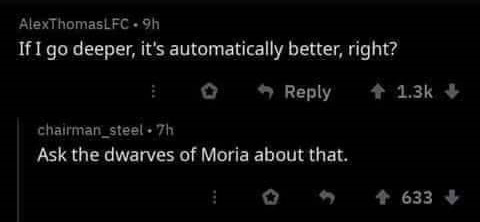
So One Piece has a lot of narrative elements that come up time and time again through out the story,
And some of these have become more and more relevant in the story especially post-timeskip. This is not a comprehensive list of all of them, just the ones that could heavily tie into Crocodile if he were Luffy's other dad, as they could reframe his character.
So, let's look at these narrative elements, how they've appeared in the story so far, and speculate how they could reflect in Crocodile.
🐊 People existing in the wrong bodies / bodies that have been altered (and what it means for you to be "you"/how does your body reflect who is on the inside)
🐊 Queerness
Wrote about this more in-depth in this post, but to keep things short; Thriller Bark, Punk Hazard, Dressrosa and Wano all heavily featured characters who have had their bodies either temporarily or permanently altered, sometimes with the person's consent and sometimes without it. Not to mention all the various characters through out the series who have gone through similar things, like Franky, Kuma as well as Brook, among countless others. As well as every Devil Fruit user who can transform their body (including every single Zoan user). People, the way they inhibit their bodies and the freedom to be who you are is very important to One Piece.
That is already a very queer-coded narrative, but then we also have explicitly queer characters. Queer characters, who have been deeply important to the story, and whose presence has become more and more prevalent with time. Not to mention how queerness in general has been "escalating" over the course of the story.
There's this video from Berry for A Thought on YouTube which explains this more in-depth, but to summarize the most important observation from the video; we have slowly gone from Kuina wishing she had been born a man, to non-binary drag queens (first one being able to temporarily change their own bio-sex by turning into someone else, to the second one being able to change anyone's bio-sex permanently), to two pre-transition transgender characters. All we really need for this escalation to reach its "peak" is if we had a (named, non-background) transgender character who has already transitioned. Unsurprisingly, Crocodile could fill that role really nicely.
🐊 Loneliness
Loneliness is generally speaking a very important theme in One Piece, as it's on the opposite side of coin with friendship on it. So many of our main characters have suffered for years from loneliness, by being ostracized and rejected by their communities, abandoned by their families, sometimes suffering for decades for the sake of their loved ones because they had promises to keep. Luffy himself considders loneliness to be most painful, scary thing imaginable.
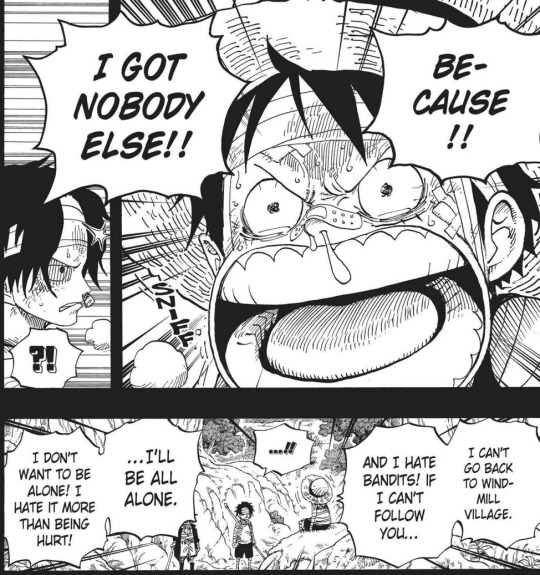
Loneliness is something queer people struggle with. A lot. Being rejected by your loved ones for who you are is a painful, common experience for many. It alone can keep many queer people in the closet for years and decades, because the fear of being left alone and abandoned is too much to bear.
Some people are accepting of queers but only as long as they stay "over there", pulling a full 180 when a family member comes out. Some people only ""accept"" trans people as long as they don't transition. And while some people may appear to be accepting of you when you come out or are early into your transition, many (trans men especially) lose friends and support the more they start to pass.
Crocodile does not trust people. He set up base in Alabasta sometime around the age of 30, meaning he spent around 14 years by himself (until he recruited Robin), unable to trust anyone. That's a long time to be alone.
Of course, there may have been a practical side to why Crocodile chose to spend over a decade in utter emotional solitude. If he was scheming to take over a country, then having anybody close who could leak his plans out and foil them would be dangerous. Hell, it's exactly what happened thanks to Robin. But having your significant other destroy your ability to trust people and then isolating yourself to avoid further heartbreak and "betrayal" could be another, potential reasoning as to why Crocodile chose solitude.
🐊 Two failed weddings and one relationship that never was
In Thriller Bark we witnessed Nami almost get married off to Absalom. On Whole Cake Island, we almost saw Sanji get married into Big Mom's family. During Egghead arc, we saw how Kuma never got to have the relationship with Ginny he had yearned for deep inside.
I already mentioned Crocodile's missing ring. How his relationship with Dragon might not have worked out because of his transition. How Crocodile's queerness could've lead into solitude, out of distrust. We already have three relationships that never worked out. So how about a fourth one.
🐊 What makes a family (/chosen families)
🐊 Family reunions (with blood-relatives)
🐊 What it's like when your blood-relatives are really horrible people
For the first half of the series, One Piece did very much focus on the concept of chosen families, as most of the Strawhats grew up with non-blood relatives that they all considdered just as much family as their actual blood relatives (if not more-so); Luffy with Ace and Sabo, Sanji and Zeff, Nami, Nojiko and Béllemere, Chopper and Hiruluk, Franky and Tom's Workers. Chosen families are deeply important to this story.
At the same time, a lot of post-timeskip OP has actually revolved around (blood) family reunions. Punk Hazard was about sending the kidnapped children back to their families (as well as Momonosuke to ""his father"" Kin'emon), Dressrosa was about reuniting all the broken families Doflamingo (and his family) had torn apart. Whole Cake Island was about Sanji reuniting with his blood family while being forced into a whole new one, and Wano allowed Momonosuke to reunite with his sister (and Kin'emon with his wife). On Egghead we've gotten to see the gutwrenching reunion between Bonney and Kuma, and we are all dying to see Luffy meet Dragon eventually.
Not to mention all the other reunions many of us are waiting to see, like Shanks and Buggy, Moria and Perona. Luffy and Garp (currently held hostage by Blackbeard), Mihawk and Zoro. And many others.
But indeed, not all the family reunions have been good. Sometimes, the blood relatives have been horrible people. Like Big Mom (to some of her children and husbands), Judge and Kaidou. Sometimes, your blood relatives suck ass.
Needless to say, Sir "I tried to bomb one million people to take over a country" Crocodile is not exactly the greatest guy around.
But what might be arguably more important is that... Why is Crocodile a plot-relevant character again, on an emotional level? As I mentioned, characters like Buggy and Mihawk relate to certain characters, so potentially getting to see them reunite with other characters would have emotional weight behind it. Mihawk and Buggy are both relevant characters both to the plot but also on an emotional level, their return to the spotlight makes sense. But then we have Crocodile, a fellow member of Cross Guild. Sure, he's definitely there to help move the plot along, no doubt about that. But emotionally speaking, why the hell is he here again? Is there a character he could "reunite with" that would have that same kind of emotional weight behind it?
You could argue Vivi perhaps, but between Vivi hating the man's guts and and Crocodile probably not giving a damn about her, I'm not sure that reunion would have that much emotional weight? Robin on the other hand could be very interesting, considdering she did live under Crocodile's protection for four years until she betrayed him, an action that seemed to have stung Crocodile. That reunion could be deeply interesting.
But you know what this post is about. If Crocodile is Luffy's other dad, then those two coming across each other would suddenly have enormous weight on it even if Luffy himself didn't know about it.
Because if Luffy were to find out, Luffy would then have to decide if he'd acknowledge Crocodile as his other dad or disown him.
Mind you, Crocodile already knows that Luffy hates his guts for what he did in Alabasta, not to even mention the fact that he tried to kill him three whole times. Luffy has every reason in the world to hate Crocodile. The man surely understands that. But then there's the fact that Crocodile isn't Luffy's mom, but his transgender father. If Dragon rejected Crocodile for being trans, why would his son be any different?
Which raises the question, would Crocodile be afraid of that? Of meeting Luffy again? Of Luffy somehow finding out and then getting rejected by him too? How does Crocodile feel about any of this?
Now of course, we the readers already know that Luffy canonically loves and respects queer people. Luffy would never look down on Crocodile for him being his dad (the warcrimes are different). But Crocodile doesn't know that. And this is what I mean by there being emotional weight on these two reuniting, as anything that could go down between these two could have massive concequences for Crocodile's character.
And please, keep in mind, although Oda hasn't dwelled too deep into the subject in One Piece, there are people who aren't accepting of queers in this world.

This prince, and his entire kingdom, could not accept his mother for who she was. An entire country crumbled because their queen came out as trans. So just like there are accepting families (including Kaidou strangely enough), there are unaccepting, queerphobic ones too. So the fear of rejection would not be unfounded.
(Also, if Crocodile and Dragon are divorced then those two coming across each other, especially after The Shit Crocodile pulled in Alabasta, would have a lot emotional weight on it too.)
🐊 The things you are willing to do and sacrifice to protect your loved ones
Shanks gave up his arm for Luffy. Zeff ate his leg so Sanji could have actual food. Béllemere died for her daughters while Nami sacrificed her freedom in an attempt to save her village. Tom gave up his life to protect Franky and Iceburg. Robin attempted to sacrifice her life so the Strawhats could continue their journey in peace. Sanji gave up his freedom for Baratie and the Strawhats. And so many countless more lives, given up for the sake of others.
So people often give Dragon shit for being a "deadbeat dad". I've discussed this in the past, so to keep it short; the World Government went out of its way to hunt an unborn child, hurting countless pregnant women, mothers and newborns while chasing for Gold Roger's son. A child who had "evil blood" and had to be exterminated from the world. Similarly, the World Government went out of its way to put a massive bounty on an eight year old child for the crime of being able to read ancient texts.
Dragon would have known and understood that if he ever had a child, as the leader of the Revolutionary Army, his child would become yet another target for the World Government to hunt, just like Ace and Robin did. This should also apply to Crocodile; if the WG found out about him having been involved with the Revolutionaries they would no doubt strip him of his Shichibukai status and make him a wanted man again. Crocodile's child would thus be in just as much danger, even if the Government didn't realize it was ALSO Dragon's son.
If Dragon wanted his son to be free and choose his own path in life, Dragon had to keep his distance from Luffy. The same would apply to Crocodile. Luffy probably ended up in Garp's care, not because his parents didn't want to raise him, but because they wanted Luffy to be free.
But as long as the World Government exists, if they ever found out about Dragon having a son, that child would end up in danger, he could become a target. And the only way to ensure that child's safety would be by eliminating the ultimate threat. The Government.
Now that is the ultimate goal of the Revolutionary Army anyways, something Dragon and co have been working towards for over two decades now. But most of their efforts have gone into freeing small countries by overthrowing corrupt governments and gaining support, little by little. Which is understandable, the WG is impossibly powerful, you can't just walk into Marijoa all willy-nilly, take out the Tenryuubito and free the world, the Government's forces would take you down within seconds.
Dragon understands this, which is no doubt why the Revolutionary Army hasn't made a move against Marijoa directly until the latest Reverie. It'd be too risky, and if the Revs were taken down, who would be left to oppose the WG? Their slow approach makes sense.
But at the same time, while the Revs did attack Marijoa, destroying the Tenryuubito's food banks and freeing a single slave... as long as the Tenryuubito are allowed to literally stay on top of the world, this attack has done nothing. They're just going to demand more tributes, they're going to enslave more people. It's going to make things worse for those who aren't in power.
It's harsh and unreasonable, and I don't agree with them, but I do understand where some fans are coming from when they considder Dragon a "fraud". If you wanted to help free the world from this corrupt rule, then you have to actually strip those in power from their status, otherwise nothing will ever change. You have to actually fight the enemy.
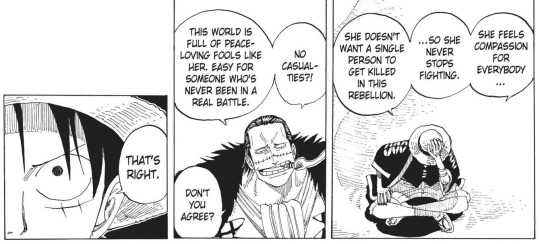
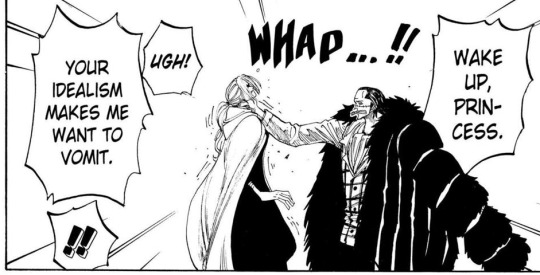
I can not tell you for certain why Crocodile wanted to create "a military nation powerful enough to oppose the World Government", I do not know for sure why he wanted to obtain an Ancient Weapon. But nuking Marijoa out of orbit sure would be a fast way to end the rule of the Tenryuubito, ensure nobody would get hurt by the World Government's corruption and slavery ever again, and make sure your son would never become targetted by them. A line of thought I'm sure Dragon would not have agreed with. But a line of thought Crocodile could believe in.
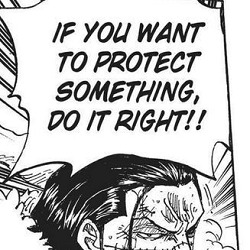
Remember how we still don't quite know what Cross Guild is up to? How the Shichibukai are based on Romancing SaGa 2's Seven Heroes, a group formed by Wagnas (Crocodile) with the swordsman Noel (Mihawk) by his side to save the world from a great evil? And how Cross Guild has been focusing on hunting down Marines by putting bounties on their heads? Make of that what you will.
🐊 Learning not just to love and trust others but to be loved as well
Robin tried to sacrifice herself not just because she loved the Strawhats, but because she thought she herself was unlovable and did not trust the crew, believing they too would betray her eventually. Sanji tried to sacrifice himself because he thought he was unworthy of being loved. Ace went through most of his life, thinking it would've been better if he had never been born at all.
We know Crocodile does not trust people. The logical assumption here is that it's because he was betrayed in the past and had his trust broken. Did he ever have a crew, in his younger pirating days? If so, what happened to them? Did they betray him, leave him? After Whitebeard kicked his ass? Who knows.
If Crocodile was in a relationship with Dragon though, it does mean that one point he loved and trusted someone, deeply. So much so they had a child. But if their relationship ended because Crocodile is trans, that would have broken his heart, wouldn't it? Made it hard for him to trust anyone ever again. And what would make you believe you were unlovable more than being rejected by your significant other for being queer.
But as I mentioned before; Luffy loves and respects trans people. His affection towards queer characters through out the series is absolutely unmatched (the way he exclusively uses the "-chan" honorific for Bon Kurei, Ivankov and Inazuma, calls Yamato a man, and is far more interested in Okiku's spooky mask than her being trans). What would be a better way for Crocodile to be reminded that he can be loved and that he can trust others than being accepted by his estranged son?
🐊 Inherited Will
In Alabasta we learn Crocodile once had a dream that he gave up upon after learning how strong the most powerful pirates of the Grand Line, the ones standing between him and his dreams, truly were. In Marineford we learn Crocodile lost to Whitebeard in his youth. During Miss Goldenweek's Cover story, we learn Crocodile dreamt of becoming Pirate King.
A dream that he shares with Luffy. An inherited will Luffy carries on.

You know the RPG trope where the final boss is either god or your dad? Yeah.
This line really hits different when you shout it at your father.

Now, all of this is fine and dandy, but what does this actually do? How would Crocodile being Luffy's other bio-father add to his character, impact Luffy and the story as a whole?
Now there's no way for me to fully predict how the plot is going to develop through out the Final Saga and what might go down. There's a million moving pieces and a billion potential directions things could go. We could be here forever debating those things.
But as I did explain in detail already, if Crocodad Real, it could heavily impact Crocodile's character depending on what does/doesn't happen.
For one, we could have an idea of why Crocodile is a plot relevant character again; if his ultimate goal had always been to destroy the World Government to protect his son at whatever cost, then we might know why he wanted to create Cross Guild to begin with; either create a military force strong enough to fight the WG on their own, or, if nothing else, dwindle down the Government's forces and be a general nuisance that leaves the WG vulnerable (perhaps enough so that the Revolutionaries can do the hard work) and/or unable to spend their resources on hunting down Luffy and the Strawhats. Crocodile could be acting as bait, a distraction to protect his son. There's a few options there.
This would also give us an idea of where that Cross Guild plotline could be heading; some people believe CG is there to join the race for One Piece and get defeated by the Strawhats, and that'll be the end of it. But now we would have another option, of Cross Guild joining the expected final war against the World Government together with the Strawhats and the Revolutionary Army.
So that's one way Crocodad could impact the story and the general direction its heading.
But then there's the character-side of things, how would Crocodad impact our characters? Now obviously, the three characters that would be most impacted by the theory would be Crocodile, Luffy and Dragon. There's some other characters too, Ivankov (since they didn't know), Robin, potentially some Cross Guild members (could they learn to respect Crocodile more sincerely if they learned that the man did in fact have a heart and something/someone he cared about and wanted to protect?) and maybe even Garp, but realistically, it's the core of the family itself.
Now Dragon already would know about everything so there'd be no Shocking Revelation for him. And based on what we saw him say about Sabo maybe being responsible for Cobra's death at the Reverie, we can make an educated guess that Dragon is Not Happy With What Crocodile Did In Alabasta.

So the two aren't on good terms, probably. Dragon might just be absolutely furious at Crocodile for what he did. Understandable tbh. I guess we're just going to be left wondering if the two could somehow ever reconcile, and whether or not they still love each other deep down, despite all the pain and hurt (and warcrimes) they've gone through.
Then there's Luffy. And I guess everything boils down to two major questions; will Luffy ever find out the truth, and if he does, will that impact how he feels about Crocodile?
'Cause it's entirely plausible the series could end with Crocodad being real and Luffy never finding out. And in that scenario, well, Crocodad could impact those other aspects of the story, just not Luffy. And in some ways that could be fine too. It could still be meaningful for Crocodile (and Dragon) that way.
But what if Luffy did find out?
Now, mind you, it's already a bit of a mystery how Luffy feels Crocodile as of now in the story; back in Impel Down he still understandably hated the man's guts with a fiery passion, but after Marineford Luffy does kind of owe Crocodile his life after he saved him. And Luffy is generally speaking pretty respectful when it comes to stuff like that. But also Luffy was unconcious when Crocodile yeeted him and Jinbei out of Akainu's reach, so does Luffy even know Crocodile saved him? (Though surely he would remember Croc sparing Ace and getting guarded from Mihawk)
Not to mention, when the Cross Guild reveal happened, the only comments we got about it where Luffy calling Buggy an idiot and Zoro being confused about Mihawk being there. They didn't even acknowledge Crocodile. It was almost like Oda seemed to avoid the subject?
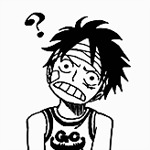
We also need to considder how much would Luffy find out? Just the basics, that his other parent is a trans man and just happens to be Crocodile? Or like, everything? From whatever his plans were with taking over Alabasta to however Crocodile might feel about his sweet baby boy?
Because if all Crocodile had wanted to do was protect his son, despite knowing he might never see him again, and if Crocodile did still unconditionally love Luffy despite everything that happened, despite knowing (/assuming) that Luffy already hates him...
Well first off, Robin nearly assassinated Iceburg and was willing to let the World Government potentially get their hands on an Ancient Weapon just to protect Luffy and co (on top of all the deaths she helped cause while working for Crocodile, all because she wanted to read the Poneglyph herself). If Luffy was willing to forgive Robin for all that, would he not forgive his dad for doing the same?
And Luffy isn't one to dismiss kindness, when people express that they genuinely care about him and his well being Luffy does respect that (even if doesn't fully reciprocate the feelings, like with Hancock). And Luffy has deep emotional intelligence too. If Crocodile was convinced he'd be rejected by Luffy for who he was, especially if that had happened to him in the past to begin with, over something Luffy wouldn't bat an eyelash at (like being trans), like. Luffy wouldn't be shitty about that.
We know Crocodile is a broken, traumatized man. We don't know how much shit he has gone through though, beyond getting his ass beat by Whitebeard and The Divorce. Knowing how Oda likes to layer trauma in character backstories*, there definitely could be more to Crocodile than just those two things, but for the sake of this post, let's just focus on The Divorce.
*(Like how Robin was alienated by her community long before the Ohara Genocide, and then spent decades of her life fleeing from the Government, hurt and abandoned by people time and time again. Or how Kuma was born into slavery, lost the love of his life and finally gave up everything he had just to save the life of his daughter. Early OP flashbacks may have been a bit simpler, but as time as gone they have definitely gotten more complex and layered, so I would not be surprised if Crocodile's Full Backstory had like 3+ layers to his trauma)
One important part of One Piece has been teaching/reminding certain characters important lessons, to change their view of the world and make them better people as a result.
Here's some of the messages of One Piece, its beating heart and soul
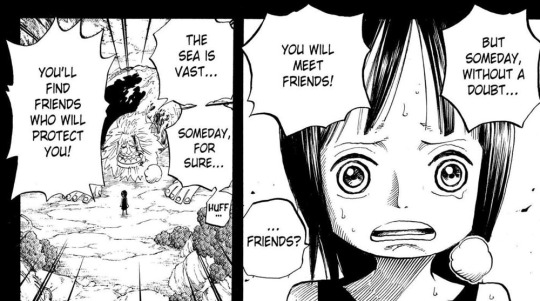
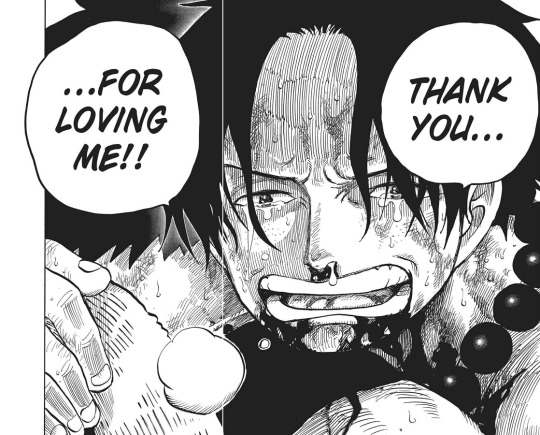
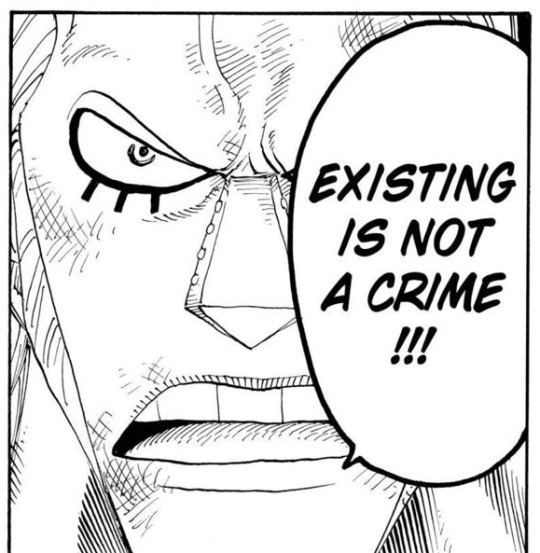
And of course, sometimes some characters can't have their minds changed, at least not that easily. But their ideals and worldview can always be challenged and proven wrong. This is what happens to many of the villians in the story.
Like Moria's ideas of how he shouldn't have to do any of the hard lifting himself and how instead of having friends he can just have replacable zombies instead. Moria's worldview was wrong, and is exactly what led to his downfall in Thriller Bark.
Or Spandam and the CP9's ideas of justice, how anything they do can be justified as it is for the "good of the world", including killing innocent civilians. They can do that, because they are "heroes of the world", they are "justice". Needless to say, none of the CP9's actions during Enies Lobby could be considdered "heroic", and, well. If "justice always prevails", then their defeat did prove theirs was a false one.
Or how Enel isn't a god, how Doflamingo doesn't have a god given right to rule (neither does Wapol for that matter), how Akainu's ideas of "absolute justice" are monstrous at best, how the way Judge and Big Mom treat their families is not how a family should be like at all.
During Alabasta, Crocodile's plans were foiled because of he didn't trust his underlings with his secret identity and refused to communicate properly with them himself. That one conversation between Crocodile and "Mr. 3" (Sanji) is more or less what allowed the Strawhats to reach Alabasta just in time to stop him.
But although distrust is what lead to Crocodile's downfall, he still carries that core belief even now; he still doesn't trust others. Which raises the question, what other beliefs might Crocodile still carry deep inside?
That he can't trust anyone because people will betray and leave him sooner or later? That nobody would ever stay by his side, that nobody will ever love him?
Are those not the exact same core messages of One Piece, the false beliefs that we've seen proven wrong, time and time again?
It really wouldn't be right to end the series without Luffy proving Crocodile wrong once and for all, and make him change his worldview, now would it? But hey, the good news is that there might be no better way to prove Crocodile wrong than to have his son unconditionally forgive him and accept him as his father.
All of this to say; yes, I think if Crocodad was real, it would heavily impact Crocodile's character and whatever character arc he might have. Like I'm not arguing for Crocodad in the name of meme'ing. His whole story could suddenly tie into so many of series' core themes and messages, and tie into our main character in a meaningful way. It could impact heavily where the story as a whole is heading.
The other, more likely option is that Crocodad isn't real and that I have lost my marbles thinking I was onto something with this post. In the end, time will be the judge of that. Thank you for reading, I hope you enjoyed my utter derangement.
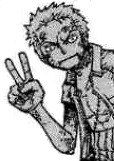
#Moon posting#OP Meta#Sir Crocodile#Crocodad#If you've been following me for long enough and read most of my daily CrocoPosting then this is mostly repeating shit I've already posted#But there is also some shit that's like. I can't remember if I posted it or if it's still rotting in my drafts unfinished#This is. So obscenely long. Good dear god.#But this is it. This is my fucking thesis.#My Brain is Soup
438 notes
·
View notes
Note
I guess the thing that makes me not so fond of Jon's addiction allegory is that it's only coherent to a certain extent? Like I think people sometimes forget that he's actively violating these people
anon, through no fault of your own you have accidentally hit upon my sleeper agent trigger phrase. I have layers of answers to this.
so first off, yeah, it's not a 1:1 direct metaphor, it's a soupy dream logic fantasy plot device with flavors of a lot of different things. there's quite a lot of addiction in there, there's some abuse of power, there's some cyclical nature of trauma, there's a dash of disability, there's a few notes of gendered violence, there's a good bit of just. violence violence and being kind of a motherfucker because goddammit it feels good to be an active agent about something in your life, even if it's just choosing to be a worse version of yourself than you strictly need to be. a lot of tma's worldbuilding is very allegorical, but apart from aspects of individual statements nothing really matches up quite 1:1 with a real world counterpart, and if more things did then it probably wouldn't be a fantasy show anymore.
secondly. okay to contextualize this answer a little bit I have a kind of hypothetical video essay project about vampirism and addiction that I like to spend a few hours thinking about every so often but am almost certainly never going to make because the full research burden required is a lot higher than I actually have the time to properly do. but because of that I've spent a lot of time sorting through why framing vampires as addicts really works for me in a way that it doesn't seem to for everyone, and I think a lot of my thoughts on that also apply to jon. there's going to be a bit of a detour here before we get back to talking about tma, but we'll get there, I prommy.
I've seen a lot of people take issue with various paranormal addiction allegories because, a lot of the time, the act that is meant to metaphorically represent the act of use itself is something that is directly and inherently harmful to others, e.g. drinking human blood, handing over power to your hedonistic Evil alter ego, holding the cursed amulet and going crazy going stupid, slurping trauma out of the head of some guy you ran into on a boat to norway, etc., and yeah, I do get that. substance use is not inherently harmful like that to anyone except sometimes the user themself, and addicts are not inherently fucked up and destructive people; those are dangerous stereotypes that often lead to the demonizing of a whole group of sick people.
here's the thing for me, though: those are definitely truths I want explored and represented when it comes to portrayals of non-allegorical actual addicts, but fantasy fiction isn't for showing the world as it is, it's for showing a subjective fun house mirror version of reality where certain aspects are minimized and magnified depending on how it feels to live through it. and yes, absolutely in real life drug use is not an inherently evil act and it does not make you an inherently evil person, but... doesn't it kind of feel like that? sort of? absolutely no one is living their best life nor on their best behavior while experiencing any kind of major mental illness episode, and when it comes to addiction you've got a very clear tangible symbol of when The Episode is happening that it feels like you have much more control over than when it comes to other illnesses. it's also a thing where people are a lot more likely to be openly angry and distrustful of you if they find out it's happening. so you mix together the ideas of "I know I get worse as a result of doing this one specific thing" + "I act less like myself when I'm using, it rearranges my priorities and I care less about hurting people because that's what happens when you're experiencing The Horrors" + "society at large/people directly around me are pretty quick to say that doing this is evil," and you get the subjective emotional result of "I hurt people by using and it makes me monstrous." I tend to respond to those kinds of paranormal allegories like they're just cutting out the middle man of those subjective fears. "using makes me monstrous" -> "using is monstrous."
anyway. jon archivist.
don't get me wrong, I totally understand if this aspect of metaphor doesn't gel for some people and they only like taking it exactly as far as the text explicitly makes them, but I really get a lot out of reading jon's connection to the fears as addiction precisely because he does genuinely awful things to people as a result of it. he's a person in a very bad physical and mental place with little to no support who is constantly being told by both allies and enemies that he's already a monster just by being alive, and he copes with that by secretly falling further and further into an compulsive act of consumption that skews his priorities and makes him care less about hurting people because at least sometimes getting to be the cause of pain makes him feel a little bit less powerless when he has to be the subject of pain the rest of the time. then he's found out and is made to stop, and he has to grapple not just with the physical toll of withdrawal but with knowing there is a not insignificant part of him that will excuse any act of malice if he knows he'll feel better afterwards.
the end of tma is very explicit in the fact that the rules of its world are shaped by the subjective worst fears of those who live in it, it's "an exercise in unreliably reality" as jonny sims put it once, and I think that principle extends backwards in some ways to apply to the rest of the show. I don't think the fact that there are only entities of fear and not hope or love is meant to be a full commentary on the total nature of the real world, it's a reflection of what fear and suffering can make the world feel like. eric and melanie both go to really harsh extremes to extricate themselves from the fears and live peaceful lives, and in both cases something happens that foils their plans (getting murdered + the apocalypse, respectively), but I don't think the intended message is to say that is definitively how real life works, they are metaphors for the limits of individual agency in larger systems and represent two types of worst-case-scenarios. similarly, I don't think reading jon as an addict implies that addiction inherently involves violence or that the reactions of those around him were completely unjustified, it's just a subjective exploration of the kinds of fears that can come with addiction dialed up to 100.
#also to be clear after the first paragraph I'm using 'you' in a general sense not directly to You The Anon Who Sent This#I'm not trying to insinuate anything about whether You The Anon Who Sent This does or doesn't have any experience w substance use#tma#answered#anons
793 notes
·
View notes
Text
you know, with hindsight now what it is I really do think a more literal reading of c!techno's chat would have helped his characterization a Lot
and mind you, this was originally intended to be the case, and very well may have been intended all along even if it wasn't usually emphasized within the lore
youtube
and don't get me wrong, I Get why it fell out of favor within the fandom. it coincides with a Very storied ableist trope that demonizes DID and disorders adjacent to it, and Can be spoken about in a way that is essentially indistinguishable from it depending on the word choice.
but the thing is ! not only does it not Have to be an allegory for DID, I straight up don't think it is At All.
because we Know what it's an allegory for. It's His Chat. there's technoblade playing the game, and there's the thousands of people watching with expectations and wants that he's compelled to meet (or, at the very least, pacify through Entertainment).
and this makes much Much more sense when conceived of as Supernatural. be that spirits, gods, demons, or anything that could fill that role. separate entities that, for whatever reason, only techno can sense the presence of and be affected by.
and of course, to an extent this is true for all creators. everyone had an audience that they were meant to entertain and the choices they made were influenced by that fact.
but technoblade came in with a Very distinct set of expectations that heavily impacted the choices he was Expected to make and the kinds of stories that he could tell. he was more or less a living legend in real life just as much as he was in roleplay, and these things were inherently connected.
and it's like !
when c!technoblade says he was peer pressured into killing tubbo at the red festival he Is technically talking about what happened within the roleplay. schlatt was demanding it from him, there's a sort of pressure there. but schlatt was also the dictator they were set to kill, and techno has never had any trouble fighting people he considered a dictator before, and certainly not Schlatt of all people.
but he WAS being peer pressured By His Audience. by thousands of people, most of which were demanding blood Because It Was The Expectation, because it'd be Fun.
out of universe technoblade made the decision he thought would be the most Entertaining, and he was right! consistently he made choices that would let him do the most bombastic Spectacles possible. And It's Great. he's Excellent at pulling dramatics and making a compelling scene that give other people room to work off of. in that sense I'd consider techno an Excellent actor, and I have to imagine that he was fun to work with.
the problem is when you then have to justify it from an in character perspective, grounded in those mushy things like Feelings with characters that can be traumatized and sustain lasting damage, Especially Without acknowledging the out of character incentive.
mind you, it's not Impossible to Create a backstory that could justify it. why a character as consistently powerful and feared as technoblade would feel pressured to kill an ally by someone he not only Can kill but Wanted To Kill. why a character as seemingly secure and in control as technoblade would lash out the way that he does to perceived betrayal, and yet consistently puts no weight onto having killed and permanently scarred an ally that trusted him.
what that'd need is tragedy. a storied history of being hurt and having to survive. building up To an untouchable god from a much much more vulnerable position. Long Lasting trauma that's lead to this deep insecurity and paranoia. and that's Possible and that's Compelling.
but it's just not in the text.
not only did we never learn basically Anything that c!technoblade was up to pre-series, we actually know Less by the end than when we started because of the sbi retconning.
it's a Theoretically Possible interpretation that's technically never Contradicted by canon, but would have to be created by scratch. it's a compelling idea for a fan fic (and one I'd like to read) and it's compelling for a theoretical recontextualization of the character, but it's just not In The Text.
meanwhile, we have the video above.
we have the Objective Fact that technoblade's decision making was often subject to the rule of cool (very Very effectively) to entertain his audience.
and most compellingly, these concepts Don't Need To Be Separate. in fact, in my opinion they're Stronger when you put them together.
because the thing is. it's Difficult to imagine techno as ever being in a vulnerable position. he is just Objectively more powerful than everyone else on the server, both in real life And within the lore. How could he have ever been afraid when he was stronger than anyone and everyone combined? when we saw with our own eyes that techno could face nearly the whole server at once and win.
but he Is a tragic character, at least he's meant to be. and that tragedy makes much Much more sense as something Inward.
technoblade as a character who Needs connection, who Needs stability, who Needs security, who Needs friendship and community and Love. but Lashes Out, Obliterates to the core of the earth, because of something that's not only out of his control but that other people Cannot Understand.
how do you explain to a child that you killed their best friend because a chorus of the undead called for his blood and you (in all the glory that he'd idolized) were unable to do anything but comply? how do you explain to that child that you beat him senseless in a pit as the restless dead jeered and laughed?
That's interesting. That's Compelling.
technoblade is idolized like a god, feared like a force of nature, and in an instant cut himself off from nearly everyone who'd considered him an ally. and that seems to be a pattern, over and over and over again. he's left isolated, and in return he faces retaliation, and in return he's always Waiting for retaliation.
and what do you say to someone who wants to kill you for being a monster? that it's Fine Actually because you only did what you did because you have a curse that compels you to? that the supernatural guided you to destroy their homes and kill their people? (rip jack manifold you will be missed)?
That Doesn't Quite Help Your Case.
technoblade as someone who is beholden to this literal cycle of violence and Loses those things that could ground him, community, stability, People, as a result. who Tries to overcome this very fact (to become a better person, in his own words as per the clip above), but is pulled back into it as a consequence of his own actions.
that's a tragedy !! that Makes Sense. that allows him to be Both this force of nature that other characters have to survive And A Person Who Is Hurt By The Same Conflict.
"I'm a person!"
that fear of dehumanization makes So So Much More Sense when you see technoblade as someone who Already fears himself. who fears being a monster, who fears losing control, who has faced isolation again and again and again.
and, importantly, it doesn't have to be anyone else's Fault.
by making the source both Internal and Completely External (something that none of the other characters have any awareness or control over), you can Have techno as a tragic character without demonizing anyone else Or erasing the impact that c!techno had on them.
and in that sense, it Can be an allegory for mental illness, but not in that direct "oooooh how scary he hears voices" kind of way that people fear it looks. but in that sometimes people Will do things that can hurt others while not feeling in control. anger and mania and paranoia, things that you can't always Control and yet that impact that you have on other people still Matters.
and the answer to that is, often, vulnerability and accountability.
I think a lot about technoblade isolating himself so near entirely from the rest of the server, and slowly gathering a support system Back by the end. and I Really Do think that framing of it through this lens is a Very impactful way of breaking it down.
tubbo, tommy, wilbur, ranboo, niki, I think they'd All understand not feeling in control. lashing out, maybe even feeling justified in the moment, but hurting people they care about and furthering their own isolation.
There's Something There, and it's already In The Text. it just needs to be expanded on.
and why not do that ourselves now?
#dream smp#dsmp#technoblade#tommyinnit#tubbo#meta#long post#back on my bullshit#I really do think that his character is just outright Stronger under this framing#and I genuinely think everything post doomsday would've been stronger if he'd leaned into this#that said this is probably messier than some of my other techno analysis#because I've been chewing on it for a few days rather than my usual of rehashing the same idea for two years in a row#but I'm rusty so give me a break#also derivakat voices is a straight up banger and you can all pry it from my cold dead hands
421 notes
·
View notes
Text
What Aang’s Relationship With His Kids Tells Us About His Relationship With Katara
Bumi: “Oh, boo-hoo. Must've been real hard for you, flying around the world with dad, riding elephant-koi all day.”
Tenzin: “Oh, so that's what this is all about.”
Kya: “That's what it's always been about. You think you're some savior who has to carry on dad's legacy.”
Tenzin: “Who else is going to do it?”
Kya: “How about all of us?”
Bumi: “Yeah, we're Aang's kids too.”
The whole problem with this family is, Aang didn’t believe that.
Aang has a long, undeviating track record of never questioning anything he believes about the Air Nomads. Who the hell has a perfect and complete understanding of their society, government, international relations, education system, religion, morality, genetics, and reproduction at age 12? According to Aang? He does.
The entire lynchpin of Aang’s Book 3 arc is all about how Air Nomads are pacifists and cannot ever under any circumstances harm a life. (We’re going to ignore the body count Aang’s already wracked up over the first two seasons for the sake of preserving his feelings because those were soulless NPCs or something.)
And yet Aang never questions this…

Monk Gyatso’s bones surrounded by a pile of Fire Nation soldier bones. The picture doesn’t fit Aang’s image of Air Nomad peace and harmony, so he ignores it entirely. It NEVER comes up despite its overwhelming relevance to Aang’s internal conflict and the sorts of advice he seeks from authority figures in the third season (despite Monk Gyatso being the penultimate authority figure in Aang’s life).
Another thing Aang never questions?
There’s no such thing as a non-airbending Air Nomad. They’re just all born that spiritual. And spirituality is the golden key that unlocks bending. (Because Bryke said so.)
Despite Guru Pathik not being a bender. Despite the fact that Zhao, literal spirit murderer, is one. Despite Toph—the most un-spiritual, cynical, feet-on-the-ground-head-nowhere-near-the-clouds member of Aang’s friend group—being the most powerful bender of the lot. Despite Hama being a waterbender equal to none but Katara while completely cut off from her culture and turning her back on everything we believe about water bending’s inherent ties to community, connectedness, and love (Iroh’s words). Despite Azula mastering the god-tier lightning technique BECAUSE she’s practically dead inside and values life least of all things. Despite the fact that Princess Yue has the literal MOON SPIRIT THAT IS THE SOURCE OF ALL WATERBENDING living inside her, and yet she still somehow manages to not be a bender.
Despite the fact that Air Nomads roam all over the world, sewing their wilds oats throughout every nation, yet no airbending toddlers ever crop up in Fire Nation or Earth Kingdom preschools.
Despite the fact that non-monogamous societies where men have multiple partners father more children and boost the population faster than in societies that favor “attached” relationships, yet the all-airbending Air Nomads still somehow have the smallest population of any ethnic group in the world.
Despite the fact that Aang’s twin, Ty Lee, is RIGHT. THERE. with her unparalleled aura-seeing, chakra blocking spirituality and her GRAY EYES in a world where color coding is ~totally~ not a thing… *sigh*
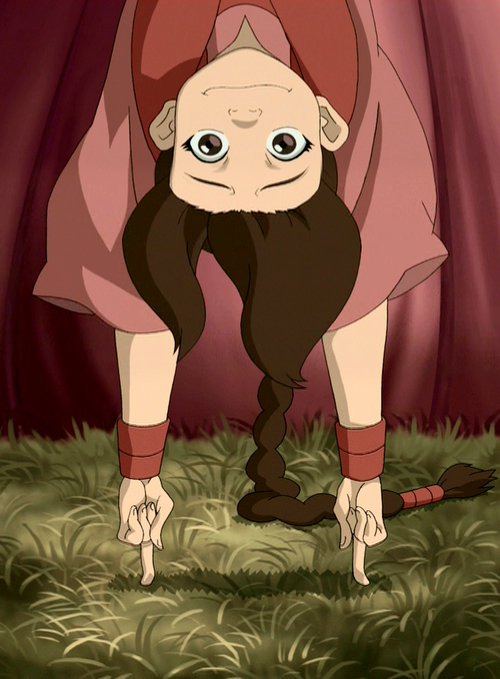
But nope. Air Nomad parentage = airbending child. Always.
So when Katara births a child that is… not an airbender? Not any kind of bender at all, in fact. There’s only one logical conclusion (in Aang’s mind).
That is not Aang’s child.
Aang never had a problem traveling with non-airbenders before. He was non-exclusionary by nature. Katara and Toph and Zuko were welcome. Sokka and Suki were welcome. The more, the merrier, in fact. Because Aang loves nothing as much as he loves an adoring audience.
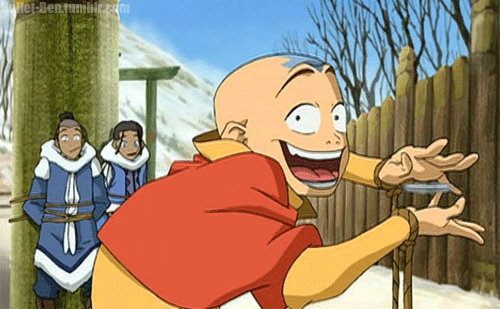
Yet Bumi never travelled with Aang.

Bumi’s as old in this picture as Aang was in the first series. He had an entire decade in which he should have been the most important thing in his parents’ lives. His personality was already more or less formed (not completed, but the groundwork was laid) by the time Tenzin came along. Bumi’s inferiority issues began long before there were any airbending children around to siphon Aang’s attention for training purposes.
Aang and Katara didn’t have another child until Bumi was on the verge of adolescence because Aang was convinced that Katara cheated. And I’m guessing it took Mr. “Let Your Anger Out, And Then Let It Go” about ten years to forgive his wife and give her the chance to get it right. (Which is at least four years longer than he gave her to forgive her mother’s murderer, in case you forgot.)
Acolyte: “Sorry, I thought you were the servants.”
Bumi: “We’re Tenzin’s brother and sister!”
Acolyte: “Avatar Aang had other children? The world is filled with more airbenders?!”
Kya: “We’re not airbenders.”
Acolyte: “Oh… I’m so sorry.”
The Air Acolytes—whose whole identity, purpose, lifestyle, and religion center around every detail of this man's life and beliefs—didn't know Aang had more than one child.
The best case scenario here is that Aang simply pretended his older children didn’t exist because he was ashamed of them and made Katara keep them shut away at all times.
And maybe that could have worked… If Aang and Katara had ever had any privacy in their relationship. But they didn’t.
The Air Acolytes have been following Aang and Katara since the comics. They’ve been there at every step of Aang and Katara’s life together. Observing. Fangirling. Emulating. Diefying. Looking for weaknesses in the relationship because Katara was only his “first girlfriend.”
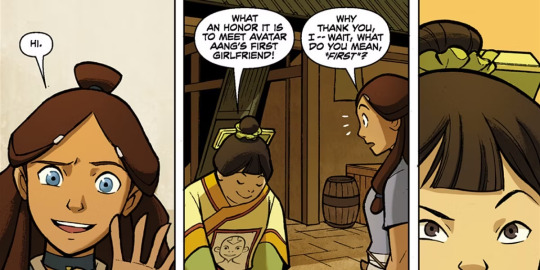
Yet, somehow, they didn’t know Aang had three children.
I can’t imagine a way for them not to know unless Aang actively told people, “Those aren’t my kids,” and let Katara bear the shame and stigma of having the world believe she was unfaithful.
All because Aang couldn't entertain the idea that he was wrong about some facet of a society he never understood clearly.
337 notes
·
View notes
Text
i've written before about how fire lady katara isn't an inherently disempowering or racist trope, as have many others, but lately i've been thinking about how arguments against fire lady katara often tend to utilise a surface-level interpretation of colonial trauma.
[edit: this post will use the term "colonial trauma" because those who argue against fire lady katara usually use the same wording or are referring to that concept. but it's important to note that according to show canon, the fire nation did not colonize the southern water tribe and zuko and katara did not have a colonizer/colonized relationship.]
antis who present this argument usually posit that marrying zuko would be a form of re-traumatization for katara, while marrying aang would "protect" her. katara is supposedly more shielded from confronting the impact of colonization in the southern water tribe or on air temple island than she would be with zuko in the fire nation, which contextualizes colonial trauma purely through the lens of physical interaction with the colonial power (ie. living in the fire nation or looking after the people of the fire nation). whether intended or not, this argument inadvertently limits colonial trauma to the geographical boundaries of the colonizing country and implies that it can be reduced or averted solely by minimizing contact with said country.
even leaving aside that we have seen katara in the fire nation (and enjoying herself there), the implication here is that active engagement with a colonial power as a member of colonized peoples is an inherent form of re-traumatization... which i take issue with for multiple reasons.
firstly, katara lives in a world that has been permanently shaped and changed by imperialism, and that's going to affect her no matter where she goes. sequestering herself in the south pole her whole life and never seeing a glimpse of fire nation red again won't allow katara to escape the legacy of colonization or the trauma it has caused her, because its influence is rooted in everything from her family to her tribe to her own bending. believe me, i understand the appeal of a world where women of colour can avoid reckoning with the impact of colonization by simply never setting foot in the colonizing country again, and why people might be uncomfortable with zutara individually as a result - but i can't accept it as a valid argument against the ship, because that's just not how colonial trauma works.
secondly, the idea that this "protects" katara reeks of paternalism because katara is not a character who chooses her path simply based on how safe or comfortable it is. if that was the case, she would never have left the southern water tribe at all! she could've remained there her whole life and likely been safe, since the fire nation had no real interest in the south pole any longer. katara is fundamentally defined by how relentlessly revolutionary she is - over and over, she chooses to do what is right, what is hard, what is unexpected, even at cost to herself. she challenges injustice and discrimination and bigotry; she fights for the downtrodden and speaks for those who can't speak for themselves; she will never ever turn her back on the people who need her. does that truly sound like someone who needs to be hid away and protected from her own supposed re-traumatization?
thirdly - and i fully accept that there are those who might disagree with this - katara actively choosing to engage with her colonial trauma can be empowering just as it can be traumatizing. don't get me wrong: as a woc and a minority in my own country, i understand how tiring it is to do this. i understand the exhaustion of confronting what was done to you and your people, of facing down bigotry over and over. i understand the desire to run away from it all, and why it can be wish fulfilment for others to let katara do so. i really, really do.
but there is also wish fulfilment in letting katara fight, as a brown girl with power and resources that few brown girls in the real world hold. there is a power fantasy in seeing katara head into the belly of the beast and emerging triumphant. there is empowerment to be found in seeing katara struggle with racism and ignorance and mindless hate to enact change - and succeed. i love reading and writing about katara unpacking her trauma regarding the fire nation, about growing to love the place she once hated, about reconciling both her homes and healing from the wounds of her childhood.
and ultimately, i think that's what katara would want for herself. after throwing herself head first into the fight against the fire nation, after facing down her greatest trauma instead of letting it consume her, after helping and protecting the people of the fire nation, after refusing to let the fire nation take anything else from her - i firmly believe that the last thing katara would do is allow herself to be ruled by the fire nation instead of being the one ruling it.
personally, i find that a more hopeful and victorious narrative than one where she remains safe and sheltered away from the fire nation, but forever haunted and dictated by her trauma. would that be realistic? perhaps. but the entire point of foiling katara with characters like jet and hama is to show that she's not doomed to be mired in the pain of her past. that where their stories could only end in tragedy, hers can - and does - end in hope for something better, as she always believed it could.
284 notes
·
View notes
Text
I'm about to give you all the single most powerful piece of advice that was ever told to me:
It is important to be a principled person.
This is more important than being a good person. But don't take this to mean I think we should be bad people.
The reason why "being principled" has more weight than "being good" is because the definition of "good" is arbitrary. It changes depending on who you ask, which means the standards of achieving goodness are always going to change and pose contradictions.
Principles are different. They are more actionable and concrete. Principles are ideas and concepts you personally value, in that you find them valuable to your lived experience. This makes them different than something like a commandment, because they're not a doctrine. Their source is your personality—who you are and the experiences that have shaped you—rather than your goals and ambitions alone.
To give an example, here are a few of my own principles:
I value self-sovereignty. I think it's a person's inherent right to be free of undue influence, and to act as agents of their own free will. (Not to be confused with acting with impunity; people have the right to experience the consequences of their own actions the same way they have the right to act upon their own free will.)
I value people. I show people courtesy as a baseline, even during arguments, until it becomes clear the other person simply wishes to engage in the spirit of hostility. And even then I don't really lash out—I just leave. At no point do I lose sight of the fact that the people I'm interacting with are as real as I am, who have feelings and complex lives the same as I do. This means I also really value trying to understand where people are coming from, and to look at things from their perspective, even if I don't agree with it.
I value being accurate, as opposed to being right. This has been a more rewarding approach for me, by comparison.
I value discernment. I want to know what things are, which means differentiating them from what I think they are from what they seem to be, and from what they are not. The reason why I practice discernment is due how I think—my brain understands things based on how they are, rather than based on what they are—but the reason why I value discernment is because it allows me to interact with the world in a much deeper way.
I value being a mammal. Life becomes easier when I (to quote another Tumblr post) let the mammal that is my body love what it loves. Fighting against this in the past proved to be a pointless and joyless endeavor.
I have more, but these are just the things that come to me off the top of my head. And keep in mind, these will likely change as I change as a person, because that is how principles work.
To be honest, I've never put much thought into whether other people should have the same principles as me; people have different personalities and lived experiences than I do, so it makes sense to me that we would all prioritize different things.
But what I do know is that I fundamentally disagree with people whose principles are antithetical to my own, principles like conquest (of self or other), conformity, purity, and controlling others. Whether or not someone realizes they're embodying these principles is another story, but in any case it's how I know who to avoid engaging with. This is regardless of someone's political alignment or identity.
In my opinion, thinking this way makes it easier to stay grounded in a rapidly-changing world, and to remain focused on what's actually important to you in the face of the unknown. It allows you to find stable ground within yourself.
227 notes
·
View notes
Text
Saviors, Suffering, and Isolation in Across the Spiderverse
Something that really stuck with me from Spider-Man Across the Spiderverse was the theme of suffering inherent in the hero narrative (and specifically the spiderman narrative) and how we can perpetuate suffering in our justification of it.
In the intro to the movie, Gwen gives background into how she became Spiderwoman. She explains the traumatic experience of inadvertently causing her friend Peter’s death and says that because of this she can’t have friends. We see how this has caused her to further suffer, forcing a wedge between her and her band, her and her father, and her and Miles. She is obsessed with not letting a loved one suffer at her hands in the same way again. Furthermore, she is okay letting herself suffer through isolation as long as her loved ones are safe.
Then, we meet Miguel, Spider Man 2099, who fervently defends his and his organization’s behavior as making sure some suffering occurs in order to prevent larger suffering. Miguel took over a different dimension’s Miguel, allowing him to have a daughter and live a happy life. However, this dimension fell apart because he was an anomaly and caused that dimension’s timeline to not flow as it should. After this, he forms the Spider-society, which is intent on making sure that anomalies are taken care of and, more importantly, that canon events happen.
This is where the main conflict of the plot arises, as a canon event in the timeline is the death of the police captain, who in Miles’s universe happens to be his father. Miguel insists that Miles has to let his father die, and rages that Miles has already helped another Spiderman (Pavitr) avoid that fate. This is not a surprise to Miguel’s character; he is tormented by his attempts to lead a happy life and therefore believes that suffering is necessary.
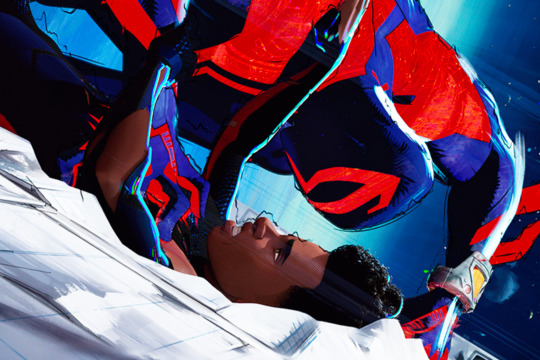
However, what is striking is that all the spider-people seemingly stand by Miguel except Miles. The characters we know, namely Peter B Parker, Jessica Drew (Spiderwoman), and Gwen all support Miguel’s perspective. This seems wildly out of character for these individuals who we’ve seen be insistent on saving people if it is in their power to do so. But it is important to note that, besides Gwen, they’ve already suffered that canon event of the police captain dying. For them, that was a necessary trauma in their lives that allowed them to be who they are today. It is in a sense a passive justification. They did all they could, but the captain had to die. But for Miles (and Gwen), the death of the captain is something they’re being forced to allow or even facilitate. They have to make the active choice to let their captains, both their fathers, die. Miles is insistent that this is wrong, and that there is another way to live.
As a story centered on characters of colors (and minority characters given Gwen is implied to be trans in the movie), this can be seen as a message about how some communities or people of color treat suffering. That is, the belief in many minority communities like mine (Hmong) is that suffering is a necessary evil to endure for the good of everyone. They suffered, so their children must suffer as well. However, this mindset moves from a coping mechanism to harm when, upon finding no or a lack of suffering, we fabricate suffering onto others like us because we believe this is necessary for success. Instead of finding help, lifting one another up, leaning on each other, we lean into the suffering, the pain, and the isolation. We are unduly harsh to our children, or we don’t try to disrupt the unjust systems that harmed us, or we just let bad situations be.
The Spider Society may be a group of spider-people, but there is surprisingly little care being given to one another’s wellbeing. Instead, they all look at each other and empathize rather than offer real care. I understand rather than let’s understand together. The coldness of this community is made clear with how harshly Jessica treats Gwen when she screws up, with how cruelly Miguel treats Peter (”I’ve had enough of you”), and most humorously with the therapy scene where the therapist spiderman rudely remarks, “Let me guess your Uncle Ben died?” The spider-people are all heavily traumatized individuals, and instead of healing they’ve worked themselves into a web of control and fatalism. By accepting that suffering as inevitable, they create the suffering of Miles.
As a daughter of a refugee, I grew up hearing the message that suffering made us strong, that it allowed them to be successful. Children who didn’t suffer were spoiled and grew up to be ungrateful wastes to society. I heard stories in my LGBTQ+ community about how young queers take things for granted and don’t understand how hard it once was. And when I suffered myself, I felt a similar urge to say that this suffering made me a better person. And this is so hard to fight because if you acknowledge the suffering wasn’t needed, that means you shouldn’t have had to go through it, that it was unjustified, that it was a random cruelty of the universe. And that is a tough truth to accept, because that means it didn’t have to be that way. Uncle Ben didn’t have to die for Spiderman to live.
In order to let our stories continue, instead of repeating the past, as well as help our communities Across the Spiderverse asks us to let go of the suffering and the belief we needed it. It is not what makes us heroes. It is not what makes us good. Instead, like Miles and Gwen (by the end of the movie), our heroism is in our love and our loved ones, and in the belief that there is a better way.
#across the spiderverse#Spiderman#spiderman across the spiderverse#miles morales#peter parker#peter b parker#spoilers#across the spiderverse spoilers#whoo this is long#miguel o'hara#jessica drew#gwen stacy#spiderpeople#spiderwoman#spiderman meta#spiderverse#across the spiderverse analysis
567 notes
·
View notes
Text


Today’s episode was heartbreaking
We’ve seen so much of Xie Lian’s pain
So much of the fall of XianLe
But now
Will you tell me that it was all his fault?
The “consequence of his actions”?
So what should we blame him for?
For being a child against the most powerful and cruel ancient evil?
The one that lived 1000 years, destroyed all the gods and deceived the entire world?
Or was he too stubborn and not listened to other people?
Well let me tell you
XIE LIAN WAS NEVER WRONG FOR NOT LISTENING TO OTHERS.
Who should he have listened to?
That very evil that told him not to try and help his people?
His guoshi who knew everything and told him nothing but to sacrifice an innocent child in “penance” to that very evil?
Should he have crushed all youngans in one go, kill the poor starving people, led to desparation?
Should he have told his own desperate people that their cure was in murder and watch the inevitable massacre?
The only thing
The only thing that he should have seriously done differently
His biggest, most fatal mistake
He did
BY LISTENING TO SOMEONE WHO TOLD HIM HE WAS WRONG
ONE TIME.
He listened to his father.
The King of Xian Le.
When at the very beginning of it all they had an argument
Where Xie Lian insisted they should melt his golden statues and let the starving homeless people into his shrines
That’s EXACTLY what they should’ve done, but they did not
Because guess what the father said
We can’t. Because we did not build the shrines and the statues.
People of Xian Le did.
Do you want to disregard your people by doing that?
SAID THE KING
Knowing VERY WELL that he is talking about THE ROYALTY OF XIAN LE.
THE RITCH PEOPLE OF XIAN LE.
THE ONES WHO LET HIM RULE.
THE ONES WHO EASILY MIGHT TAKE HIS POWER
AND LIFE AWAY
IF HE DISPLEASES THEM.
But he knows how to PHRASE IT RIGHT to his son who CHERISHES HIS PEOPLE NO MATTER THE STATUS.
And who might very much not know the intricacies behind the ruler’s chambers.
Because Xie Lian
Was
Never
Meant
TO RULE.
He was raised to be a Martial God.
To fight demons and grant wishes.
NOT
TO RULE
A COUNTRY
BUT GUESS WHO
WHO WAS SUPPOSED TO RULE THE COUNTRY????
WHO WAS SUPPOSED TO MAKE SURE A HUGE PART OF IT WON’T STARVE TO DEATH?????
THE KING
And his son had to
ABANDON HEAVEN
To come deal with his mess
You can try blaming Xie Lian for not listening to the prayers from that part of Xian Le.
But he did not NOT listen.
He DID NOT HEAR.
Because the prayers system of “the ritcher - the louder” is inherently corrupt.
And growing up in a wealthy capital
Xie Lian must’ve not even SUSPECTED that there’ll be a part of his country so poor that no offerings would be enough for him to hear the prayers.
He did not know.
BUT THE KING
DID.
There’s no way he didn’t.
Yet does anyone
Does anyone in the book
And outside, anyone of the readers
Ever thought to blame him?
No.
Not even once have i seen this take.
Not even i realised it until recently. Thanks to my dear friend @3luecactuz
And why?
Because Xie Lian tells us the story.
And he himself
Completely believes
That it was all his fault.
When his only real fault was in not standing his ground
Agains the only person
Who held authority in his eyes.
Who was the authority in his life from the very beginning of it.
Who, no matter the future arguments, was the person he loved.
His father.
In the face of the greatest crisis he’s ever seen
Under the pressure to make the right choice for so many innocent lives
He gives in and listenes to a person who he not only inherently trusts
But who objectively had much more experience and knowledge than him
Who’s flaws he has not yet seen clearly enough. And never will.
Because this person raised him to be
Perfect.
And he failed.
Because no one is perfect.
And he believed in it in the wrong time and place. He gave in.
Decided to look for another solution.
And gave the evil orchestrating his demise just enough time to pull the first string.
Of many.
So tell me.
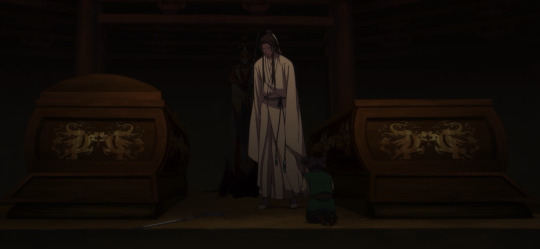
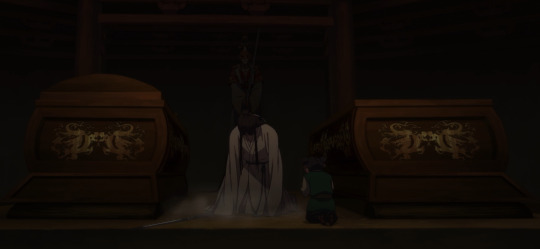
Really, tell me.
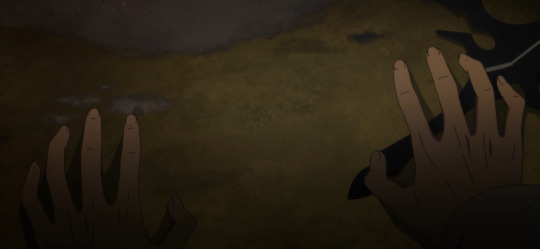
Did he deserve this?

Should he have listened more?
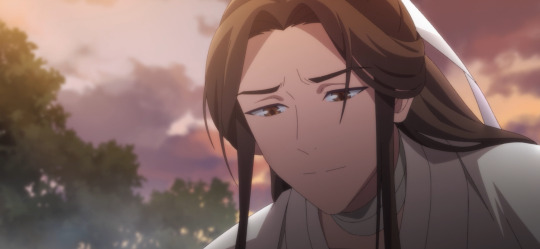
Should he have?

Or maybe
Just maybe
He needed someone
Who could have told him
To do what he thinks is right.
#you are welcome to argue#to tell me that i missed something#i was meaning to write this for a long time now#but i wanted to reread book 2 just to be sure#but#after this episode#i couldn’t take it anymore#so i guess#we’ll see#in the next episode.#of the next season.#tgcf#hualian#xie lian#hua cheng#tian guan ci fu#tgcf thoughts#tgcf donghua#tgcf season 2#heaven officials blessing#天官赐福#花怜#谢怜#tgcf s2#tgcf s2ep12#tgcf analysis#tgcf meta#tgcf book 2#tgcf spoilers
174 notes
·
View notes
Text
Bonnie was not assigned a gender at birth but her concept of gender is so heavily based on her perception of human society and the narratives she creates around its ruins like. She is a woman by her own definition, informed by her interpretations of old human stuff, because who else could have defined “woman” for her???? Being a woman, to her, means being powerful and creative and taking care of your loved ones. Not to mention, there’s no way that little tadpole nub just grew into a human shape!!!!! She made herself look like her perception of a human woman/girl On Purpose!!!!! Gender is a puzzle and a series of observations, just like everything else about people and relationships and society. So like. Yeah when she first encountered the expectation that women/girls should have boyfriends, she trashed those magazines for her rat to shit on like any ambitious tween lesbian piece of gum would!!! But then someone she created herself reinforced that expectation, and then so did so many other people, and maybe she thought she had no choice or maybe she felt guilty or maybe she was just tired.
But again. We are all just fucking playing with little dolls in the game of life or whatever. Some more than others (……………… yeah Bonnie lol) BUT LISTEN gender is obviously a construct that we understand first and foremost through observation BUT our (or at least 20th century/PW’s generation’s) human perception of gender and the characters’ observations and interpretations do it are so goddamn important to every single character in this show. They are all performing a role and a big part of that role is gender. Once again BMO is the most flexible about this performance because BMO is the most childlike (emotionally/mentally youngest in this case bc obvs many children develop awareness and self consciousness around gender roles very very young) and therefore the least bothered by society’s expectations!!! Just like in real life!!!!
To start out, all Bonnie knows of femininity and womanhood is that mothers are women, and princesses are girls, and mothers and princesses are powerful and caring. And then she finds out that girls and women are supposed to have boyfriends, and that seems really wrong to her, but she has to be a girl/woman because she is a mother and a princess to the extent that she understands those roles!! Meaning not 100% in line with the human definition (mothers don’t raise their children the mammal way, princesses are inherently the highest rulers of their kingdoms) but rather based on her perception of it. Which like GET THIS!!!!! Our perceptions of human definitions of gender and societal roles ARE the definitions of those things!!!!!!!!! I wanna scream abt it it’s so fuckign interesting!!!!!!!!!!!!!!!! Anyway tangent but in conclusion Princess Bonnibel Bubblegum is the most transgender character ever to NOT actually have any gender assigned at birth to be transing (unless the MG whispered it to her ig) and that’s just how cool she is!!
#adventure time#princess bubblegum#bonnibel bubblegum#obvs this is autistic!bonnie#but since I have cptsd and it overlaps a whole lot I will also say extremely cptsd!bonnie#definitely both#this is so important to me I should edit it better but I’m too excited lol#jus talkin#mine
193 notes
·
View notes
Note
Narratively speaking, when should the batkids be able to beat Batman single-handedly? Sure, Cass can do it already and Dick is seen as above or on Batman's level but what are your thoughts on this? It's always hard to do this stupid power level stuff because the character you want to win is obviously gonna win, but you still have to show that Batman is this super ubermensch martial artist who always has a plan and whose goal is to make his kids surpass him but then how do you do that? When can you say, "yeah Batman's cool and all but [enter batkid's name] would totally wipe the floor with the old man if they were to fight 1v1"? This is extremely exaggerated but you get what I mean, right?
I'm genuinely fascinated by this question and I thought I could just ask you.
Thanks!😀
Yeah, it’s all biased like you pointed out since we all want our special blorbo to be the most special blorbo, even in situations where the logic gets pretty thin.
The thing with Bruce is, in his prime, he’s a god-tier fighter for multiple reasons. He’s got insane training under his belt, he’s at or above peak physical human conditioning, he’s trained to think strategically about combat, he’s fast for his size (despite his size), and he’s BIG.
The last one is so important. He’s anywhere from 6’ to 6’4, 190 to 240 lbs of muscle, etc. He’s not losing to most people in a fair fight! And he’s definitely not losing to someone much shorter and lighter than him when it comes to sheer power.
What’s interesting about the comics is that they largely argue that Bruce losing these 1v1s comes down to skill and experience. Cass trained for years to be a weapon, and her advanced training is what supposedly tips the scales in her favor. Same thing with Damian. Bruce makes the argument that enough training can create conditions for his Robins to surpass him, like you mentioned.
But is that actually a fair determinator of a fight? Can most if not all advantages Bruce might have in a fight with a woman half his size be overcome by volume or rigor of training?
It’s the comics, so the answer changes depending on what’s intriguing and fun. We can oscillate between Bruce being the ultimate overpowered fighter who can’t ever lose and Bruce getting his ass handed to him by his kids because it all comes down to power ranking, which is SO subjective.
Should the Batkids be able to beat him? In my opinion, not when he’s in his prime and it’s a fair fight. That isn’t me saying that they can’t win 1v1 through skill, misdirection, getting lucky, etc.
That’s not me trying to shit on female fighters either. Dick carrying 30-40 lbs less muscle than Bruce puts him at a disadvantage too. Jason being the same weight but not as fast/nimble puts him at a disadvantage to Bruce. Damian being a child fighting an adult will ALWAYS result in an unbalanced fight.
If you’ve ever squared up with a heavier, larger, more skilled opponent — especially if you’re a woman and they’re a man — one of the first things you have to learn is that, when it comes to pure strength, you cannot hope to win. It is an inherent advantage, and why we have weight classes for fighting.
Your goal is to figure out a way to get around that advantage. To be smarter, or faster. We teach women about throws and the benefits of having a lower center of gravity. We teach kids the benefits of being flexible or smaller in certain holds. Things like that.
But comics aren’t real life. The better question is, have we overpowered Bruce in a way that makes taking him down a peg or two somewhat difficult or implausible? How can we better show his flaws and complexity as a character when the stakes get set too high?
#that’s a long way of saying#yes it’s a tricky subject#hopefully this isn’t a terrible take#bruce wayne#batman#dc#asks#anon#batfamily
94 notes
·
View notes
Text
Interesting to look at the power dynamic between Ianthe and Coronabeth (less "dynamic" more "leash") through the lens of Patrick Rothfuss' "inherent" vs. "granted" power idea. To summarize: inherent power is the stuff you can do naked and alone in the wilderness (e.g. knowing how to make a fire or cast a spell), while granted power requires a social or interpersonal structure through which you can exert your will because of trust, station, or some other social contract (e.g. having a servant or an army). The following will be a misconstrual of Rothfuss' exact textual intent, but I'm tweaking the idea to match this relationship.
Ianthe is a good mix of both, but mainly inherent; Corona is almost entirely granted, with very little inherent. Crucially, Ianthe is inherently powerful before she's granted any power and Corona is granted power before she's inherently powerful. Yes, of course, Corona is obsessively dependent on Ianthe--it seems fairly clear that she believes Ianthe is the one granting her all her power, which is largely true--but because Corona is both Hot as Fuck and Incredibly Cool (as far as most in-universe perspectives are concerned), people around her are willing to grant her influence at the drop of a hat. Notice how, even with several far more qualified and authoritative opinions in the room, Corona still manages to get her thoughts in the door in Canaan House? Notice how her charisma has kept her and Ianthe's ruse afloat for their entire lives? It genuinely doesn't fall apart until Corona has a complete breakdown. Even with Blood of Eden, who don't seem to want to value her as more than an intelligence asset, seem to actually respect her opinion. This reads like a red flag, to me, indicating that her charisma is obscuring her general lack of functional competency (just like how it works in real life).
Starting in Gideon the Ninth and cementing in As Yet Unsent, we see how Coronabeth is genuinely upset at her lack of inherent power. She's learning the rapier to make up for it. Of course, by Nona the Ninth, she's reentered a power structure at a hierarchical tier that mostly negates her need for inherent power. But what we're seeing here is her frustration manifesting: she's tried as hard as she's able, past her emotional blocks, to shed the power she believes Ianthe has granted her, and to (in her mind) reach her own inherent power.
But Corona doesn't understand inherent power. She's never really had it, not in the way she sees those around her exert. Naberius is top-tier as a House Cavalier. Ianthe is one-in-a-million as an adept (well, two with Harrow around). Corona tries to learn to fight, but can only compare herself to Naberius, which is supremely unfair. She reaches and reaches and reaches for inherent power, something she can do after everyone's left her behind, but she never really grasps it in a way that means anything to her. This leads to the belief that any inherent power she may gain for herself will feel granted.
The problem we see, of course, is that she's building a snow fort (reputation and power in BoE) to stop a lahar (reputation and power in Ianthe's eyes). Sure, she can actually experience something adjacent to self-esteem while she's building the snow fort, but once that lahar comes by, it's over. She's swept back up into her dependency. She realizes that the power she was granted by BoE feels like nothing in comparison to even a smidge of respect, even if it's laden with condescension, from Ianthe.
Corona's reliance on Ianthe parallels Ianthe's reliance on herself. By the time she's reintroduced in Nona the Ninth, Ianthe has been taking a good long crack at this whole "Emperor's Authority" thing and... seems to find it repulsive. Ianthe is all hands, all fingers, sticking them in where work needs to be done and expecting to complete that work before she has to withdraw to do something else. She was raised on the "shut the fuck up and work" principle, where Corona was raised on the "keep talking so nobody notices what's happening" principle. One of the key differences between the two is that Ianthe has been consistently seeing the results of her own inherent power for her entire life. She can hold the results of a project in her hands and feel pride--even if most of the pride she feels is the Deadly Sin kind.
Now that Ianthe has graduated from "inherently powerful" to "inherently powerful, so you're in charge of people", she has to cope with the idea of having somebody else do it. She cannot conceive of "somebody else" doing a job as well as she can. It's just not her lived experience. She's always been the best necromancer in the room, with the best talker in the room at her beck and call. Sure, the charisma she nets by having Corona around is granted power, but it's important that she doesn't see it that way. Corona is HER mouth. Corona doesn't get her own thoughts, and if she voices any, it's a flight of fancy in Ianthe's mind.
Because of the fact that Ianthe doesn't understand granted power, she believes that any power granted TO her is inherent. It's a supremely selfish perspective brought on by years of the self-satisfactory view that everyone else is relying on you, and it's not even hard to do what they need.
The sisters as a pair are obviously deeply mismatched, but I think Ianthe's ascendance to Lyctorhood marks a threshold being crossed (as in the Monomyth) where Ianthe begins to live in a world that Corona cannot touch in any way. There's a level of influence granted by charisma and speeches and hotness in the regular world of the Nine Houses, but once Ianthe ascends beyond that, Coronabeth is vestigial. Ianthe no longer needs charisma and speeches and hotness; she's acquired the physical power and been granted the influence to make all of those redundant. She speaks or thinks and things happen. There are only like five or six people left who can even pose a challenge to her, and half of them are Resurrection Beasts, which don't even count.
This leaves Corona collapsed coughing in the dust, two county lines behind. What the hell is she good for? The same stuff as before? No, in her mind, she's just a sexy leech that Ianthe pried off when she became a Lyctor. A leech without a food source shrivels and dies. She attaches herself to BoE, but after a lifetime of sucking the rich blood of Ianthe's necromantic talent, Corona wastes away on the anemic influence of the new group. Simultaneously, Ianthe has put on nail-shaped goggles, and by god does she have a big hammer. Now that her mouth, Corona, is gone, she has to lean on the belief that she's powerful enough to handle everything she used to get Corona to do with raw power. It's almost sad, but she's such a bitch that it's just pathetic.
I did not proofread this.
339 notes
·
View notes
Note
Fanfic with noncon/dubcon, underage, and incest did not lead to me being preyed upon by my father. It took a lot of smooth talking, boundary-testing, manipulation of my perspective of events and myself (the "you're special therefore it's okay" approach to convincing a child to do something society has firmly established is wrong) and years of ongoing bursts of affection, gifts and spoiling in order to get me to "consent" (to whatever degree a ten year old can) to sleep with him. Fanfic did not teach me that incest, adult/child romance, or sex with an underage person by an adult were okay.
Fanfic authors who got really fucking concerned when I kicked in the door to yell about how A/B as a pairing was just like my dad and I hit my DMs hard and asked for details and urged me to get away from him as quickly as possible. I say authors plural because I blocked the first couple of people who tried to talk sense into me but somewhere around the fourth person gently asking for details I started to doubt the "you're special and therefore it's okay" narrative and within six months of being into A/B, a father/daughter incest pairing with an underaged character, the fic authors had untangled for me a lot of complicated feelings and planted doubts in me so successfully about how my father was using his power that I spilled the beans to my mom.
There's this idea in fandom that fic did it, fic made people get abused. Actually, though, fic didn't do it. My father did. He had more input on my life than every fanfic I had ever read and put in a lot of work to get me to a place where he could pitch sex as a loving act between two people who love and adore one another in a society that's too backwards to understand that there are exceptions to the normal rules of what's right and what's wrong. I didn't get groomed by a fanfic, I got groomed by the one family member I lived with, who by virtue of being the only family member I had spent more than a few days with had inherently a very large amount of power over me.
Fic authors, unrelated women from other states and other countries, all acting independently of one another, stopped it.
I get that antis love the idea that my dad wasn't responsible for my abuse, some 25 year old writing A/B in their studio apartment is, but no matter how hard they try to take blame off of him to put it onto someone neither of us ever met, at the end of the day the person responsible for pedophilic, incestuous abuse... is the pedophile fucking his only child. It's him. He did it. He put in a lot of work to do it, it wasn't an idea a fic put in his head that he randomly acted on, he worked at making it happen in a way his conscience could live with for years, and he would not have been stopped if only media didn't write so many father/daughter couples with ten year olds that we were meant to support. Media doesn't show that, for one thing, but more importantly, even if media did, the man made years' worth of repeated decisions to get me onboard with it so he could (he thought) get away with it and do it without guilt.
To me, the "fic did it" argument is basically the "your dad didn't do it" argument. It does not blame a grown man for acts of abuse that he undertook knowingly and willingly. It doesn't blame him for anything.
And to me, that's what dangerous about antis. The abuser is never at fault for abusing someone, even a child, according to their worldview and the abuser had no choice in the matter, somehow. The real culprit is someone who wrote something that has a hundred hits on FFN or AO3, not the man who crawled into bed with a ten year old.
The last person who told me it wasn't his choice to do what he did was my dad. That's what anti rhetoric reminds me of.
--
392 notes
·
View notes
Note
You said the arcs of certain characters in TOH have an 'Us vs. Them mentality.' I take it that's because, as you say, the narrative pins the bad qualities of certain characters on separate parties (e.g. "Amity's flaws are only because of her mom"), but would you care to elaborate further on said mentality and how it sticks out to you in TOH?
So shockingly, not really. It plays into it but I am actually inherently talking about the same sort of mentality that Belos perpetuates but back onto Luz. After all, if you look at the main cast by even mid season 2 we have a problem forming.
Eda: Has lost her criminal edge, has no personal interests, is defined by being nice in a way befitting Luz's worldview. Momma Eda.
Amity: No longer is studious and hard working but instead focuses more on her girlfriend and her nerdy interests. Is also now just nice. Was only shown genuine care by Luz, instead of just trying to fulfill her nerdy desires, once she finds out Amity is into Azura.
Lilith: Has turned into a nerd and given up on any ambitions that had led to her previous actions, becoming a nice cool aunt. Only now has Luz tried to form any relationship with her (admittedly, she didn't get many chances before now).
Hunter: Has only been being given kindness because he has shown a capacity for kindness that Luz only really started showing him, beyond not wanting him to die, once he showed he had a nerdy interest in wild magic.
Gus: Was a nerd from go and always nice, even if he could be slightly selfish.
Willow: By mid S2, is essentially out of the show for the past half season, has never had a strong personality and is just nice. Yes, she'll start her jock stuff soon... And never have a real conversation with Luz again, at least not until S3 maybe? So a full season where Luz and Willow, after Willow might have stopped being nerdy/an outcast, where Luz doesn't have an interest in her anymore.
And uh, just as a reminder to S3, Hunter gains a scifi interest post redemption and Luz explicitly listens to NOTHING her mother says to her during her big speech in For the Future until she reveals herself to be a secret nerd. At that point, suddenly Luz dials in.
For TOH, a show supposedly about the individual and self expression, characters either lose their personality and/or gain the personality that matches LUZ. There is less character variety in interests and personalities than even 90s cartoons much of the time by the end of TOH because these characters all lose so much of themselves fitting in with the good guys, especially the redeemed ones.
This is where your argument for this does come into play. I'll frame it as the fandom likes to with Amity: "She didn't have Luz in her life yet."
Amity is only a bitch while she is hanging out with the wrong crowd. Socialites, those with ambition and jocks. The Luz enters her life and despite the fact that the ONE time Luz ever calls Amity out for being a bitch being when Amity is being a bully to King and clearly trying to get a rise out of Luz, making that moment meaningless, that simple fact starts warping Amity. Starts making her turn back to her good, nerdy side. And because this is such an inherently good thing, there is no difficulty in doing this. She needs no motivation, no calling out, nothing. She just needs to desire to be like Luz/liked by Luz. She can discard her entire friend group and do things that should get her disowned with how evil Odalia is and face zero consequences because... I guess that's the power of becoming a nerd.
You are beyond reproach. You can only do good. Same goes for Hunter. Despite YEARS of potential propaganda and the like, Luz just getting into his life and admittedly jabbing at Belos/him a little, is all it takes for him to embrace the inherent goodness, displayed by his nerdiness about wild magic, and start becoming a better person. For this, he loses his home but that is only seen as a positive because indeed, he got away from those hostile that made him a bad person. He could now be a good person because he no longer had those influences and could embrace Luz's way of life.
With the show's themes, why is this the case? Shouldn't their base personalities be allowed to exist? Shouldn't a wide range of ideologies and the like be allowed since that is a part of self expression? Instead, when people don't like Luz approves, they are disapproved by Luz and either need to get the fuck out or conform.
And this is all without getting into how she becomes Jesus in the last episode...
None of this is intentional but if someone told me that the show felt hostile to them because they didn't consider themselves a nerd or because they tried to get somewhere in life, I wouldn't blame them. The show has a weirdly narrow belief in who is a good person. Who is allowed to exist in the main cast, a problem that cascades issues into a lot of its themes. I mean, this is the first show I've ever had to ask if character arcs are actually hurt the themes of the show because of this, a blog I sadly couldn't refind.
There is admittedly an element of this where I might not have thought about it without the fandom. Most people I know who are multi-fandom still agree that TOH is aggressive against others, even for a fandom. That it lashes out and blames others for its problems. Almost like a *gestures at the thesis*
And that doesn't help make any of this be less uncomfortable unfortunately. See you next tale.
======+++++======
I have a public Discord for any and all who want to join!
I also have an Amazon page for all of my original works in various forms of character focused romances from cute, teenage romance to erotica series of my past.
I have an Ao3 for my fanfiction projects as well if that catches your fancy instead.
If you want to hang out with me, I stream from time to time and love to chat with chat.
A Twitter you can follow too
And a Kofi if you like what I do and want to help out with the fact that disability doesn’t pay much.
50 notes
·
View notes
Text
What we learned from the war
"Endings are hard" is a something of a truism, but it's borne out in Bleach, where every story arc besides after the first two stumbled at the finish (even the endings of the first two arcs don't really "end" so much as continue into a new story). In the Arrancar arc, the number of characters and plotlines got so overwhelming that an ending that had to be rushed if it was to arrive at all. In the Lost Agent arc, the characters were pared down, but the ending wound up thematically inconsistent with the story anyways, possibly due to real-life circumstances. And the Thousand-Year Blood War somehow managed to have both problems.
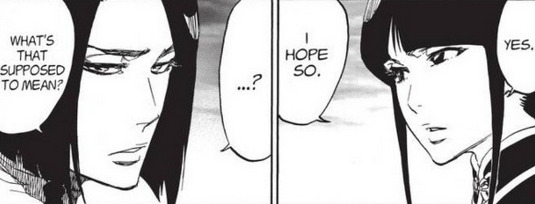
The change in direction from "tightly focused character drama" to "sprawling cast of soldiers" meant that it was unlikely to ever give us the development of our protagonist that we craved, and that lack of focus was only aggravated by the widely-reported health problems of the author. And yet, perhaps because we don't get that, because so little of this arc is filtered through Ichigo learning about himself, we get a much clearer statement of the values inherent in the work.

This is most evident in our antagonists for this Arc. Yhwach and the Wandenreich don't really have the relationship with Ichigo that previoius antagonists had. He never knew his Quincy heritage, never identified with their ideals, and so feels very little conflict about opposing them. He doesn't ever develop his Quincy powers, at least beyond integrating them with his already existing powerset. And he doesn't take much of a personal interest in Yhwach, who in turn, doesn't seem to think much of him when he's not directly in front of him.

But for all that Ichigo doesn't end up having much of a dynamic with them, the Wandenreich still manages to maintain a unique character. Every antagonist has a priority, something that they are willing to do great evil for. For Soul Society, it's its own existence, the continuation of the system they've built. For Aizen, it's his own self-aggrandizement. For the Fullbringers, it was simply living another day, screwing over others so that they can't screw you first. But the Wandenreich has no such priority. They simply want it all to end.
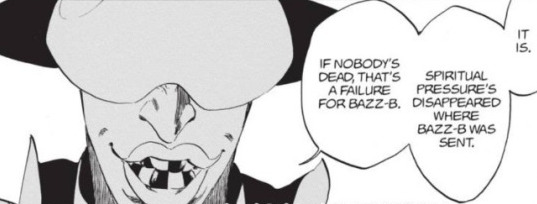
That's most obvious in Yhwach's ending monologue, but you can see it from the very beginning as he kills Yamamoto, the man who tried to move on from his bloody past being slaughtered by the man who would absolutely not let it go. Yhwach shows more emotion towards the skeletons of Argola and Huberdt, his dead soldiers from a war long lost, than he does towards any of his living subordinates. And his subordinates follow his lead in showing no love to one another, happily stabbing each other in the back without even the Arrancars' uneasy level of camaraderie. Their movement has no future, and neither do they, so nihilism is the only recourse.

Most of the time. I think it's important to note that every time a member of the Wandenreich expresses positive feelings towards one of their comrades, it's immediately followed by them turning on Yhwach. Liltotto, Bazz, Giselle, eventually, in her own twisted way…even Jugram, at the very end. Sure, Yhwach kills them for their impertinence (he is the bad guy), but he also massacres the Wandenreich faithful en masse. There's no salvation, only death, and he'll enforce that state on his followers rather than allow them to discover any alternative.

I imagine the lesson, and the general attitude of the Wandenreich, was not lost on Uryu Ishida. Even in his relative paucity of appearances, it's he who is at the moral center of the arc. His culture, which he had thought was nearly entirely dead, turns out to be alive, and out for vengeance against the people who exterminated them. It's something he probably fantasized about growing up, and I don't blame him for joining. How could he not?
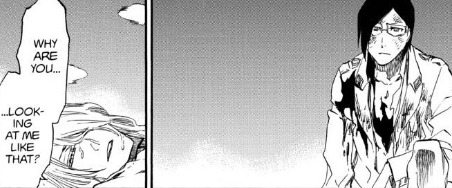
But at the end, he makes the very easy choice. Calling it a matter of "life and death" is a little on the nose, but it's morally quite black and white. Yhwach has no hope for this world, or for his people within it, or even himself. He lost a war for the nature of existence to a monster a thousand years ago, and never got over it. But Uryu has the strength to look at the horrors of this world and yet hope for better. Because he has people he loves in life, and who love him in return, he can dream of a better tomorrow.
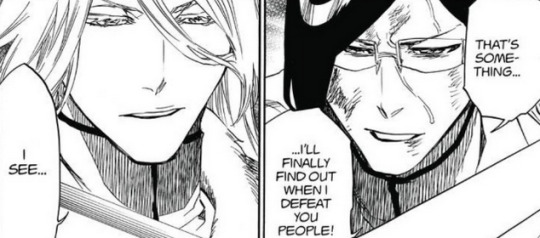
And that's what the ending is all about. Yhwach loses to Ichigo, and it is very much "good guy beats bad guy". But he also loses to Uryu, and to "I hope to have a family with my girlfriend who I love so much" Renji Abarai, and to "I have a tremendous amount of hope to eventually make myself king of everything" Sosuke Aizen, and eventually (in a way I'm still confused about mechanically) to the child Ichigo and Orihime will eventually have, the literal embodiment of the potential of the future.
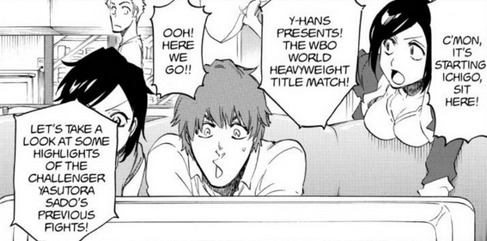
The final villain of Bleach is not society's tendency to preserve itself at any human cost. It's not individual selfishness, or manipulativeness, or any of the many vices we saw embodied in the hollows throughout the series. It's despair, the idea that life might not be worth living even through all the struggles and horrors our protagonists have endured. Sure, it will always raise its head, sometimes at the most inconvenient, or ill-fitting times. But having its reincarnation be blown away by the supernaturally normal lives of our cast…well, that's as clear of a message as I can imagine.
#bleach#troius reads bleach#bleach meta#this turned out way more positive than I thought it would?#I dunno I guess I just think “choose life” is a pretty great message for a comic book aimed at teenagers#who would have thought the Wandenreich would win me over in the end#even if I still think their aesthetic is kinda silly
57 notes
·
View notes
Text
JEWS DON'T PROSELYTIZE
So let’s get onto the topic of Jews and proselytizing. It’s a topic that surprizes me when I reflect on how strongly I feel about it. I’ve noticed that others also feel very strongly about it. I wanted to unpack why it triggers something so powerful in me when I see Jews appearing to proselytize - that is - attempting to convert non-Jews to Judaism. It’s precisely because proselytizing is so alien to Jews in feeling and practice that I was struck by the posts of this online account:
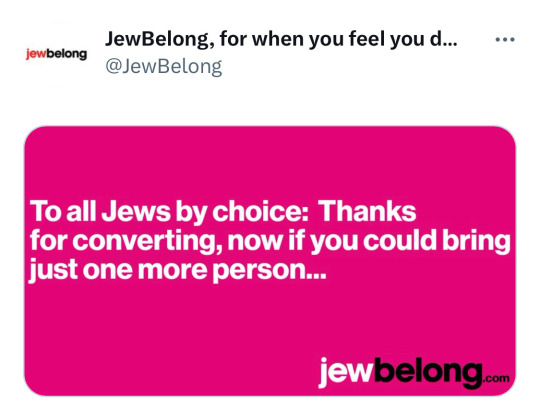
Similar messaging even appeared on, (what presumably are), paid for adverts on roadside billboards:
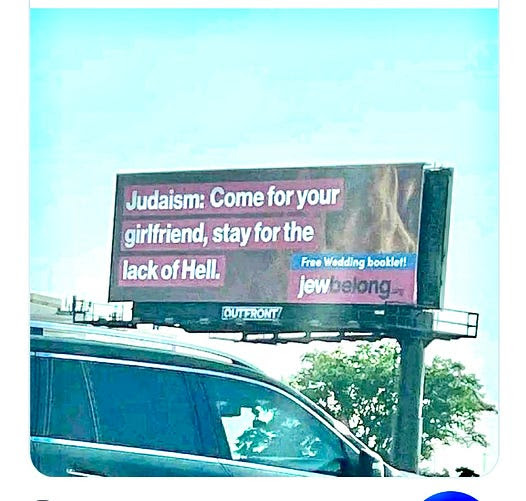
Firstly, let’s not allow people of bad faith or bad intellect to pretend there’s some kind of anti-convert sentiment behind my reaction to this advert and my antipathy towards proselytizing. Converts are as Jewish as the prophets. My two favourite Jews in real life happen to be converts and they’ve enriched and deepened my relationship with my tribe.
The question is really one of how non-Jews come to Judaism.
As I understand it, converts are people who come to Judaism of their own volition. They are not caught by casting out a net as these billboards attempt. Following the compass of your own heart which points you towards the Jewish people is a beautiful power. The unique, organic footsteps that bring each convert to the true home of their soul are less likely to be reversed, retraced and tip-toed back out of than someone who was sold the religion as if it was a Subway sandwich. These are people who truly want to bind their destiny with us because they truly are us. Those who fall in love with Jews and convert before marriage have also experienced a calling of the soul - the organic flourishing of love within their heart.
None of these converts were cold-called by a telesalesman offering them an opportunity too good to be true. They weren’t cynically recruited as an exercise in numbers. They weren’t randomly solicited, persuaded, manipulated, hunted or worked upon - which is exactly what these billboards are doing. They are trying to manipulate and work on non-Jews in order persuade them to abandon who they are - as if whoever they are is inherently a lesser thing - and to become Jewish. These adverts are capitalism in action. They are as tawdry as an advert for Doritos. Surely advertising the Torah like it’s some cleaning product competing against other cleaning products is rank? And I write this as a secular Jew. If you want Judaism to compete in the marketplace like Kentucky Fried Chicken or Mountain Dew - then I think that cheapens and degrades what you’re “selling”.
Adverts also target our insecurity. The heart of advertising is to tell us we’re not good enough unless we own this product. You smell bad. You look ugly. You’re uninteresting. Firstly, a non-Jew is as perfect as a Jew. They don’t have to become Jewish to have value - and Jews don’t need others to become Jewish for our tribe to have value. We don’t need to be validated by getting non-Jews to join us. Secondly: I think it’s irresponsible and distasteful for Judaism to proselytise as it risks taking advantage of the weak and vulnerable. If someone succumbs to your idealistic sales pitch when not at their best - you’re inflicting a lot of damage if they decide it’s not for them in the future. Someone extricating themself from a religion they adopted whilst in a bad place is more emotionally complicated than someone trying out a hair product and deciding it’s not for them.
I also think we should be unashamed in saying it’s better to have quality over quantity. We don’t need members of the tribe just for the sake of it. In any venture in life, it’s better to have a small group of people whose hearts are truly into something than simply going for numbers. We have to ask the question: why proselytize in the first place? What’s the goal? We’re a tiny minority but our numbers are fairly stable. We’ve been around for thousands of years and aren’t going anywhere soon? Why proselytize? Why would we want to go out converting non-Jews? And why don’t we?
This leads to the most profound reason for not proselytising - one that’s important not just for the Jews - but for the world at large.
Jews choosing not to proselytize is the most beautiful rejection of an anti-totalitarian instinct. We don’t proselytize precisely because we’re not trying to take over the world. We just want a small corner of it where we can be free. And we’re happy for others to be free. We’ll mix and get on with everyone and participate fully in the world. But we’d be awfully unhappy if people didn’t accept us as we are and tried to stop us being Jews. We hope that everyone else mixes, interacts and participates as fully as they want to with the world. But we don’t think they should have to stop being themselves to do so.
Whether people like it or not there’s a totalitarian instinct ingrained in the act of proselytizing. And it’s not just confined to spiritual faith groups. Political sects such as communism are also on a mission to convert people.
The starting point and end goal of those who proselytize is thus: if everyone is the same then the world will be a good place. If everyone accepts Jesus there will be heaven on earth. If everyone accepts the prophet Muhammed there will be peace. If everyone accepts the teachings of Marx there will be utopia.
By NOT proselytizing, Judaism communicates that people can be different and the world can still be a good place. We don’t all have to think the same. We don’t have to dress the same. We don’t have to pray to the same God. We don’t need to dominate others and turn them into us. People are allowed to be different. It is the most profound example of live and let live in action. It is a rejection of mass uniformity and global group think. Jews - with their passionately held convictions and belief they possess certain truths - are not trying to force it on others.
We need to absorb how revolutionary and powerful this concept is. To have ideas you cherish and believe are life enhancing - and to be able to enjoy them without trying to force them on others. It is bizarre that some people’s enjoyment of a thing is reduced if other people aren’t enjoying it too. To then go out and try to convert others by persuasion or the sword is an insane level of insecurity.
Proselytizing is not just questionable because it leads harassment, bullying and domination - the goal of global group think would be awful if achieved. A healthy nation, a healthy civilisation, a healthy planet will venerate difference - not domination. The friction of different perspectives is absolutely essential for human vitality and progress.
So I honestly don’t know what the people who post materials that stray into proselytizing are playing at. Converts will come - as they do and as they always have done. And they are among the best of us. But going out hunting them isn’t bringing something to Judaism. It’s taking something away.
Anyway, it doesn’t affect me - I worship Zeus.
Only joking.
Thanks for reading. I hope I’ve converted you to the beauty of accepting converts without actively trying to convert people.
Sending love to all Jews who are beautiful and perfect as Jews - and love to all non-Jews who are beautiful and perfect as non-Jews.
Once again, if you think my articles are welcome contributions to ongoing debates and have some value, please do subscribe:
LEE KERN
226 notes
·
View notes